#but despite his act of contrivance there is realness behind it
Photo

Deity: The Radiant Unborn, Outer god of Nascent Calamity
“I know what I’ve done and I stand by my actions. Better that this world is a barren place free of warmpth or mirth than give that thing a chance to take root”
-Ymelie of Arrowgate, heretical witchhunter, taken as part testimony prior to her execution
Creation is a sacred act no matter how small or fleeting, which is what makes it so perverse when that act is suborned to the will of another. Luminaries forced to build weapons to practice their science, the artist who’s work is stolen for the glory of another, young people forced to live a life they never would have wanted just to uphold a social order. The world is made darker by these cruel concessions, and in that darkness a cruel light thrives.
it has no name, no real will, its existence is charted in the wake of devastation it causes, rather than in a doctrine espoused by its followers. It is known by those who delve the occult mysteries of the cosmos as the Radiant Unborn and simply put: It turns creative potential into a bomb, feeding off what could be in a pyroclastic eruption of fire, flesh, and chaos.
Wretched Origin is a god in only the loosest sense that it distorts reality the way a god might, the way a body might be distorted by a high velocity impact transmuting what was once alive through several distinct phases until what is left is nothing but gore and tragedy. No one would call what it does a miracle: It begins first as a fever in the body of some poor victim forced to make some terrible and unwanted compromise, they grow worse as their flesh chars from within and they near the point of no return, at which point the Unborn blossoms within them and destroys everything it touches.
What is left behind in the aftermath can never be predicted. Some grotesque aberration may come into being as a bit of the far realm slips through, other times it is some avenging nightmare wrought to do their “parents” secret will, despite their remains still smoldering in a nearby crater. Still rarer are those times that the victim is left relatively unscathed, burnt and disoriented but left otherwise unharmed in a sea of devastation.
Hooks
The party is called to seek the apprentice of a in influential mage, after a disastrous experiment on the student’s part led to several deaths. Guilt ridden and feverish, the student wanders the city rehashing the equations they’d so carefully practiced, letting the Radiant Unborn take root in their mind. This whole fiasco was contrived by one of the mage’s rivals, who sabotaged the apprentice’s experiment by working a few of the outergod’s signs into her research materials. His aim is to have the apprentice blow up in the mage’s face, possibly taking out a rival and letting him advance his position.
Some aberrations seem to call upon Wretched Origin as part of their life cycle, spawning progeny in ways their alien anatomy might not allow. A plane hopping scientist has theorized that the outergod only became dangerous when it jumped to mortal life through eldritch cross contamination the way most plague starts off as a mostly harmless sickness in livestock. This scientist happens to have the past several decades as a brain-in-a-jar and has very few qualms about testing their theories through human experimentation.
All eyes in the tavern turn to the previously sullen young man (mostly overlooked by the party) as he rises screaming from his seat, dumps his drink over himself, begins steaming, and then barrels out the door to hurl himself in the nearest canal. Pulling him free of the murky and near boiling water, the party gets his story: Apparently he’s a journeyman sculptor, forced by his master to work on a statue for the very same magistrate who evicted his family in the middle of winter some years ago when he decided to collect on rents early. Resentful over the months of poverty and near starvation forced upon them, the sculptor feels like there’s something inside him trying to get out, with these burning fits coming on more and more as the day of the statue’s unveiling draws closer.
There’s one group that tolerates, and even welcomes the presence of the Radiant Unborn: Harsupex, those goreslicked oracles who prognosticate upon the future by picking through the guts of sacrifices, animal or otherwise. The viscera spilled by the outergod is held to be particularly potent when it comes to prophesying future calamities, though many who indulge in this fusion of forbidden arts ( what with needing a human sacrifice to invoke the Unborn’s presence) grow nihilistic or obsessed, either convinced the end is inevitable or else desperate to stop it. Some of these doomsayers go so far as to take on the scorching infection, using regeneration magic to stuff their own innerds back together to allow for repeated glimpses of a doomed future.
Titles: Wretched Origin, The Nova Blister, Weltwelp
Signs: Spontaneous Human Combustion, Viscera like shapes in flames.
Symbols: A Seven Pointed Star composed irregular, sometimes curving lines. Usually carved or painted in red. Seems to evoke entrails
Followers: Other than the aforementioned aberrations, very few actively worship the Radiant Unborn, with a few profane magical traditions cultivating it the way a alchemist might cultivate a sprig of rare poison. To be Glib: It gets a lot of bang for your buck if all you want is to cause chaos at the cost of a ruined life or two.
#I'll admit this one is fucked up but the art really got to me#cw birth#horror#lovecraftian#outergod#divinity: fire#divinity: chaos#divinity: disaster#divinity#deity#low level#mid level#villian#town#mystery#rescue mission#wizard#sorcerer#abberations#dnd#adventure#5e homebrew#homebrew adventure#undead#oracle#tharizdun
370 notes
·
View notes
Text
My opinion on the story of Murders of Karlov Manor
XXXX With spoilers! You have been warned! XXXX
I was initially very sceptical when Murders of Karlov Manor was announced, but I wanted to give the story behind it a chance. (After „Phyrexia“ and „All will be one“, my bar was set very low). My secret hope was that the schemes of Tezzeret (FANBOY!) and Lazav hinted in Greg Weisman's "War of the Spark" book would finally be flourish. Plunging Ravnica into chaos. More Tezzeret (finally with his Darksteel Body).
I also found the first story interesting, didn't quite know what to make of Proft and was curious to see what would happen next. In general, a murder-mystery story is always a fine art. Do you manage to write it in such a way that the attentive reader ends up with the same keys as the detective? Or - as in many films - are there 15 minutes of scenes that are essential to solving the mystery? However, with each successive story, my enthusiasm was dampened and my eyebrow rose higher and higher.
When the murderer was finally caught, it was there again. The feeling of the Phyrexia/All will be one story-arc. I find it a great pity that it seems as if the simplest solution is always taken. The characters are sometimes not written consistently and the end of the respective arc leaves you unsatisfied. Somehow you can feel in the stories that perhaps there is simply a lack of love for the protagonists and that's why they act OOC. The author did a good job and wrote a great story, but if the briefing says that Trostani, or rather Oba, is the vengeful retribution, there's nothing you can do. For me personally, the revenge motif is simply too heavy-handed in this context. It seems as if they had thought about who is least expected to be the murderer. Then they tried to knit a motif around it. It all seemed so incredibly contrived to me and didn't feel natural in the course of the story.
What bothered me in general, however, were (unfortunately) many other aspects of the story in Ravnica. For one thing: Niv-Mizzet? It might have been nice to see/hear the living guild pact on this topic. Proft himself was a very unlikeable character to me. There's nothing wrong with creating a super intelligent Sherlock Holmes variation, but then it needs wit or a flaw. Proft unfortunately had neither and in the scene where he explains her job to Erata, I found it rather ridiculously over the top. What Krenko was doing in this whole scene - with all the guild leaders, I still wonder. Yes, he's a VIP in Ravnica. But to integrate him into the story because of that?
Another big aspect that I find very unfortunate are the open storylines. Teysa is/was a double agent? Judith is planning her own coup? The Simic are experimenting with glisterin oil? All great ideas, but unfortunately they were either nipped in the bud or, in the case of Proft, not pursued any further. Who was the intruder in his mind palace? Emarkul? Jace? A new party?
But despite everything I'm criticizing, I'd also like to highlight what I thought was good. As a big Kaya fan, I like the way the Planeswalker was portrayed. Her sassy demeanour, which often just serves as a protective shield. I also liked the way she was treated as a planeswalker in Ravnica. A story arc that I thought was great in the non-canon comics. The city/plane of Ravnica has a real problem with multiversal invaders and Kaya and Ral are met with distrust and anger. I think it just felt natural in the storyline. Ral Zarek only had a brief appearance, but he was electrifying. (Well? huh? You get it?.... Sorry…)
The author, Seanan McGuire, has also written a good story that beautifully depicts Ravnica, the guilds and everything that goes with it. There was also - especially at the beginning - a lot of excitement and joy when the new chapter was published.
Basically, I would have liked to have seen a few open story lines (Lazav and Tezzeret) picked up and no new ones opened up. Only to be quickly cut short again.
I would be interested to hear your opinion on this? Am I being too critical? What do you think about the murderer and her motive?
#lexxlikes magic the gathering#magic the gathering#mtg#mtg community#mtgcommunity#murders at karlov manor#story review#review#opinion
11 notes
·
View notes
Text
"All Eyes on Me" from Bo Burnham's special really hits me in the gut over and over because the line about taking a break and working on himself to get better, only for the pandemic to happen.....just.....it's so relatable. I quit working my way up the management ladder and went part-time and moved back to the city I loved and was getting therapy and was doing so much better than when I was in St. Louis, where I'd have weekly panic attacks and weekly spirals where I was dizzy and nauseous and couldn't stop crying.....and then the pandemic happened and I probably hit the lowest spot I've been in forever. And I'm doing better. but that line. just makes me realize it was probably a pretty common experience for the 20 and 30 somethings out there.
#bo burnham#inside#all eyes on me#sam rants about their life#inside was a real masterpiece#like I know everyone talks about it like it's Burnham's diary or vlog and it's not#it's a very specifically constructed one man musical show that mainly focuses on mental health during ''these current times''#but the songs are all good because there is heart and real emotions behind it#it's why I've always liked Burnham.....normally parody songs grate my nerves#but despite his act of contrivance there is realness behind it#how much realness? who knows#I don't know bo burnham and have no idea which life experiences he's had that are informing his art and which he's just empathizing with#but there is something real
6 notes
·
View notes
Text
The next part of my review-marathon on the path to No Way Home is...
Spider-Man 2 (2004)
The opening segment of this movie might be the best undiluted dose of ‘Parker Luck’ we’ve ever gotten.
From our first glimpse of Peter on his scooter, you are taken on such a ride of mishaps and triumphs, only for the rug to be swept out from under him at every turn. It finds an excuse to get some Spidey-swinging action with the brilliant moment of “he stole that guy’s pizzas”, which highlights the levels Peter is taking to keep this job, but doesn’t undercut his heroism as we follow up with saving the two kids. The cut from Peter’s blank stare after getting fired from the pizza place to him getting fired at the Bugle is simply masterful.
It pulls no punches as we see Peter get pushed into the dirt more and more, all the while keeping Spider-Man above all that, until eventually his powers fail him and the superhero comes tumbling down to Peter’s level. And then we get Spidey in the elevator – the Raimi films keeping up this trend of strong one-off moments and characters that give so much personality to the world. The elevator could have been a 10-second gag, but we linger on the awkwardness and get a humorous reminder of the human beneath the mask.
Let’s talk about Alfred Molina’s Octavius. From his first scene, there’s a lingering arrogance about him – this subtle impatience beneath his niceties that so perfectly allows us to believe his turn from well-meaning scientist to the rampaging Doc Ock. It’s so well done in fact, that the inclusion of the inhibitor chip ends up trying to fix an issue where there is none. It’s as if the filmmakers feared we wouldn’t believe the character turn, so they very deliberately explain to us that if the chip breaks, the arms gain control. It’s a shame, because we’ve already seen the voice-in-the-head done so well in Spider-Man 1. Now we see a pattern emerging that too easily paints the villains in a sympathetic light - they have the ‘fallback’ of them being manipulated. Even so, the film evokes a nice symbolism by the end, where the arms represent Otto’s unfeeling, scientific mind, and Peter appeals to the man behind it. His arc is very well-crafted, and let down only slightly by giving the arms too much identity early on.
The part of this movie that loses me on rewatching is Spidey’s encounter with Doc Ock at the bank. I love this fight, I love Ock saying ‘butterfingers’, I love Aunt May’s involvement. However, it does feel contrived that Ock reaches through the crowd to grab her, and that he’s at the same bank in the first place… and once again we get this odd lack of acknowledgment of events – Aunt May was put in extreme danger after Peter seemingly flees, and the whole ordeal is hand-waved into a single line in a much later scene. I could get into other, finer details, but here’s what throws me about the bank scene on a larger scale:
Peter has just witnessed the return of someone he now understands to be incredibly dangerous. Someone responsible for the deaths of multiple people, and the creation of an unstable, city-destroying device. The last time he saw this man, Octavius chose to attack Spider-Man rather than risk stopping his experiment, and now, he has put the most important person in Peter’s life into direct and conscious mortal peril…. then, two scenes later, Peter decides to stop being Spider-Man.
I understand that a factor of this is that he’s losing his powers, but there is so much at stake here, and Peter’s not stupid. This is the city. This is Aunt May. Yet I feel like Peter acts more selfishly here than his choice that got Uncle Ben killed. Here, he gives up his powers for Mary Jane and a normal life, despite knowing the immediate and very real threat posed by Octavius. He makes that choice.
And I want to focus on that. He makes that choice. ‘We are who we choose to be’. And Peter, in the first movie, chose to be Spider-Man. It’s the defining piece of that movie, but fast-forward to this one, he needs to be told by his college physician that actually, no, he can un-make the choice… just to eventually make it again. The movie implies this is a new realization, but for me it’s frustratingly cyclical.
And the broader problem I have with this is, it’s not really about the choice! Yes, he’s given the pep talk from Aunt May, and after the apartment fire he acknowledges that he can’t save everyone as Peter Parker. These are great scenes. But his powers refuse to return – refuse to account for his great responsibility - until Ock puts MJ in danger. Only when his personal life is once again put into peril - now the film allows him to be back. The apartment fire is meant to show us his will to act on what’s right, and his commitment to doing so despite his situation in life. Aunt May’s words, and Peter’s reflection on Octavius reinforce the notion of sacrificing selfish dreams to do good for others. It’s what redeems the villain, and saves the day. I feel like there’s so much focus put on this side of things, on the choice to sacrifice, that what the movie is saying about balance gets kind of lost in the epilogue.
Ultimately, Peter’s powers returning are about him finding equilibrium in who he is, and this is something he can’t do alone. The first movie’s opening narration tells us that this story is ‘all about girl’, and this one ends with MJ telling him that he shouldn’t live as ‘half of himself’. It’s lovely, it’s heart-felt. “Isn’t it about time somebody saved your life?” is such a beautiful line, I just wish we got to linger on that atmosphere a little more. I wish they could have shown that his powers hadn’t fully returned until that moment, to really let the importance of it sink in. Maybe this film could have done with some closing narration like the first, or maybe we didn’t need the ending swing here and could just leave them together, I’m not sure. I’m certainly torn on the final shot of MJ, her expression hard to read.
It’s also frustrating because by this point the movies have delivered an image of MJ that’s quite shallow when it comes to relationships. In the first film, she went from Flash to Harry in an instant, then quickly became interested in the thrill of Spider-Man, going so far as to claim she was in love with him. Yet after one flowery speech from Peter, she’s tilted in his direction. And here, she’s been together with John for who knows how long, but is still willing to kiss Peter behind her fiancé’s back, before leaving him at the altar. This is shown to be a consistent character flaw for her - and that’s okay! It’s good that she’s not perfect, and the movies touch on her backstory to give us some understanding to that… but it’s only ever touched on – we don’t ever get time for her to unravel her family issues, or see the story address the way she jumps from boyfriend to boyfriend. She is left in that shallow insecurity, and it becomes hard to applaud the core theme of balancing one’s life, when the person making that claim has not been given the chance to become balanced herself. Can we definitively say that she and Peter are right for each other? Does the movie even want us to? Either way, it trips itself somewhat.
Meanwhile, Harry’s story is more or less left in the weeds. Norman’s ghost appears, evoking an implication that Harry is going mad. But Harry unequivocally denies the ghost’s wish for revenge, which is followed up by the discovery that his father was a mass-murdering psychopath. The eerie build-up and menacing music foreshadows Harry will take up the mantle in some fashion, but… why? He’s just shown he isn’t interested in vengeance, and the death of his father at the hands of his friend can now be understood as a hero killing a villain. This set-up could have gone in many directions, but before even touching on Spider-Man 3 it leaves this odd open ending. And I find it interesting how moments like this have seemingly escaped the ire of ‘sequel foreshadowing’ that more recent movies like TASM2 have received.
The final thing I want to note is Spidey’s personality. In the first film, he’s mostly a standard hero archetype, which works well. Even so, he did get in the occasional quip. We had “let mom and dad talk”, and “it’s you who’s out, Gobby”, and heck, even “Cheese!” when he’s posing for his own photos. These worked because the scenes allowed for these moments of levity – for the audience and for the character. In the second film, dialogue from Spidey is very narrative-focused, and almost clinical ‘hero talk’. He lectures kids on not playing in the streets, later informs Octavius he’s pulling the plug on his machine. Peter is allowed to be comedic, but it’s as if once the mask is on, the jokes are off. The one scene where they permit Spidey to be a little bit quippy... is the bank scene. “Here’s your change” is cute, but when faced with a mentor-turned-murderer, the levity in Spidey’s character feels misplaced.
I could get more granular, but ultimately, this film does a lot right as a sequel. On revisiting the trilogy, I find my regard for the first movie overtaking this one to a degree. Which I am okay with, as there is plenty to be enjoyed in both.
One final thing - the fight on the train is incredible, and deserves its place in the hall of fame.
-
-
Rating:
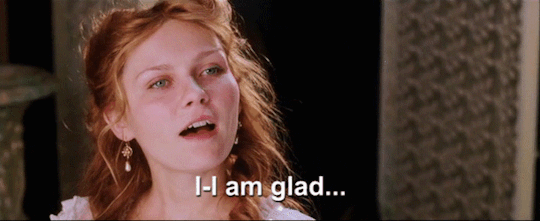
75 notes
·
View notes
Text
The Voyage So Far: Alabasta (Part One)
east blue (1 | 2) || alabasta (1 | 2) || skypiea || water 7 || enies lobby || thriller bark || paramount war (1 | 2) || fishman island || punk hazard || dressrosa (1 | 2) || whole cake island || wano (1 | 2)
(this is a repost, i deleted the first version of it by accident cause im Idiot)
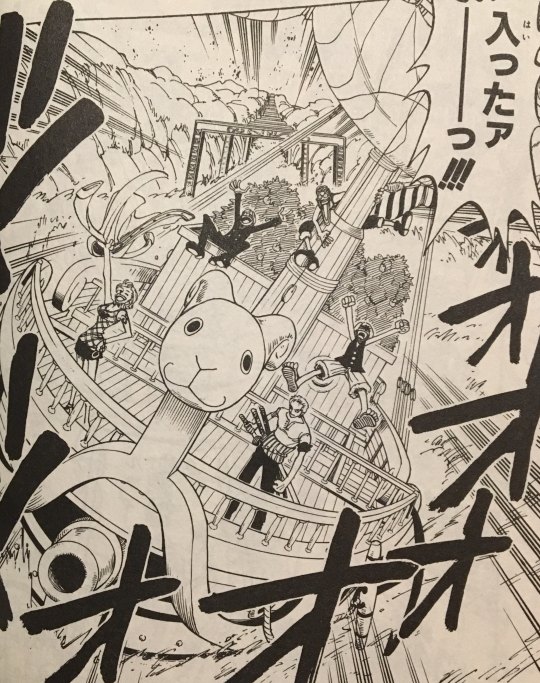
the entry into the grand line is such a great sequence. it feels like such an ending- a triumph after they’ve spent pretty much all of east blue struggling to make it here, and at the same time the beginning of a new adventure, the biggest yet, one that has yet to end a solid two decades later. they all look so happy to have made it here- it makes me smile.
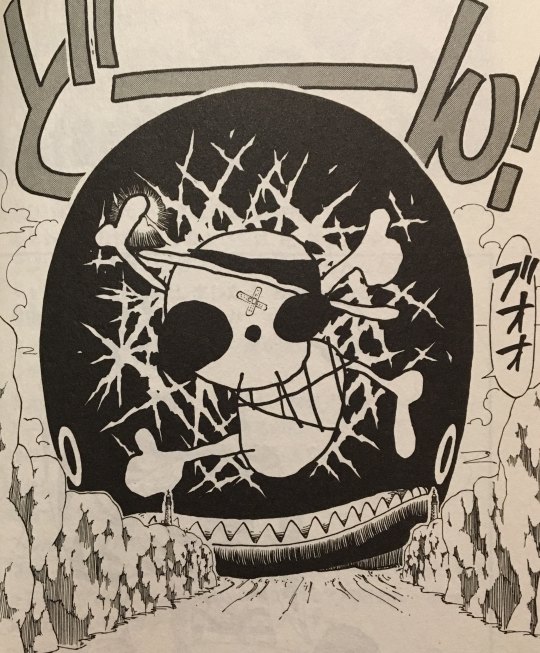
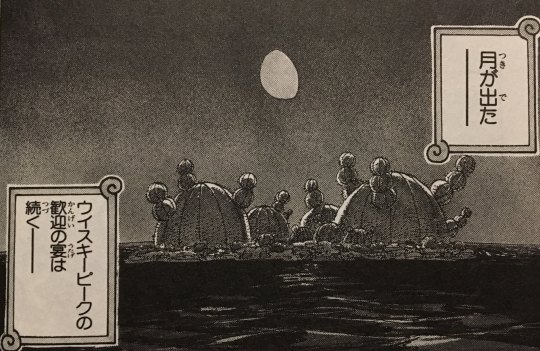
whiskey peak is one of my very favorite short arcs, and i think of the whole first half of the baroque works saga its the one that hits and maintains a tone best (almost certainly because its so short, admittedly, but still). i love the repeated shots of the moon, the reveal that the cactuses are actually covered in graves, the way everything seems far too good to be true at the start and the sense of suspense that creates.
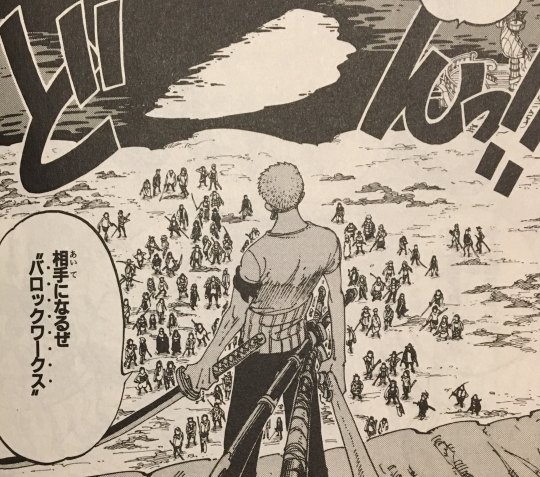
zoro’s extended fight scene in whiskey peak is so great- it’s so creative and so dynamic and the odds are stacked so high against him and yet he’s clearly having so much fun. i do miss this sort of scrappy, improvised fight, cause its largely absent from later one piece but its SO much fun to read- zoro cutting holes in rooftops for people to fall through or shoving ladders to the ground as bounty hunters try to climb them.
i’m a huge fan of fight scenes that use the environment to their fullest, and this is such a perfect example of it. it makes the fight feel a lot more real and exciting, in my opinion.
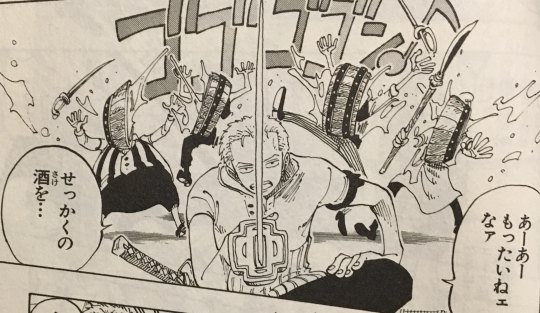
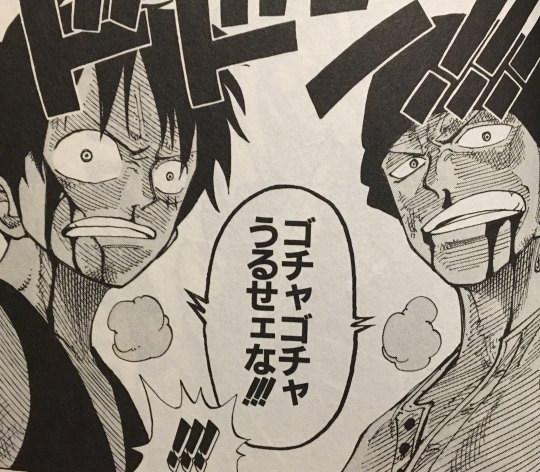
i’ve never liked zoro and luffy fighting at whiskey peak, its always struck me as frustrating and contrived and kind of out of character for both of them, but i will say that i do like how on the same page they are even when they’re trying to kill each other.
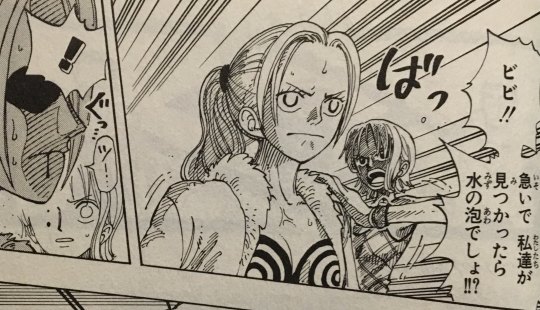
the entire first half of the baroque works saga basically serves to introduce and endear us to vivi so we’ll be invested in the alabasta conflict, and that starts here in whiskey peak, when we get our first glimpse of her actual personality rather than the act she was putting on as miss wednesday, when she bites her lip hard enough to bleed in order not to break down at igaram’s apparent death.
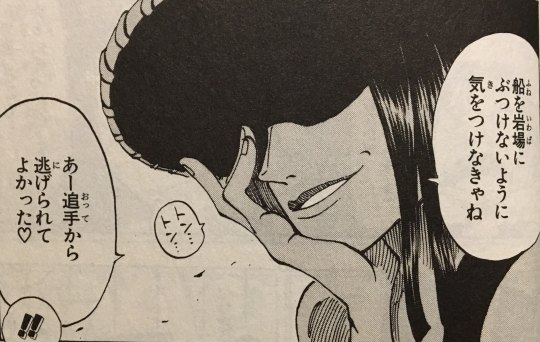
watching robin’s actions with the added context of later one piece is one of the great joys of rereading alabasta. she does a fantastic job of appearing to be crocodile’s most dedicated and capable and dangerous employee while quietly but consistently sabotaging his efforts; saving luffy, sparing pell, sparing igaram, not telling crocodile anything about the strawhats despite meeting them here at the very start of the saga.
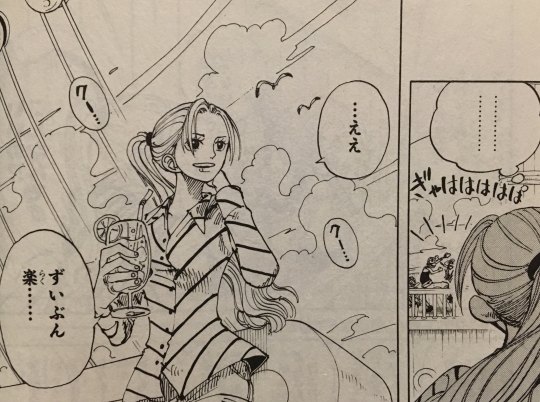
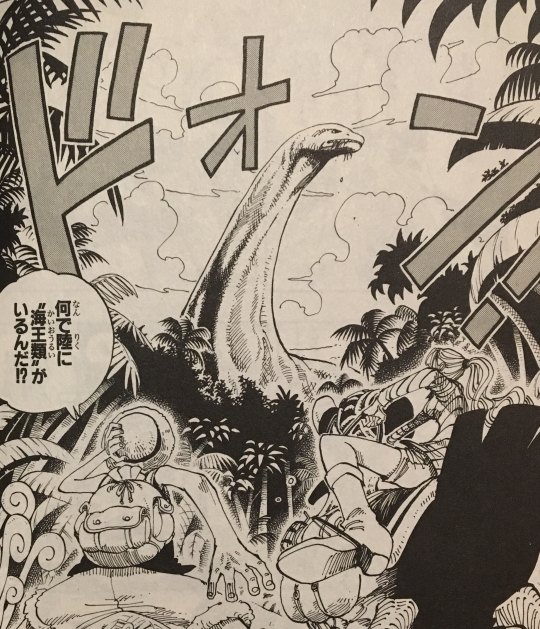
little garden has some really cool and striking panels that really put the scale of things on the island, the dinosaurs and giants alike, into perspective, and i love it.
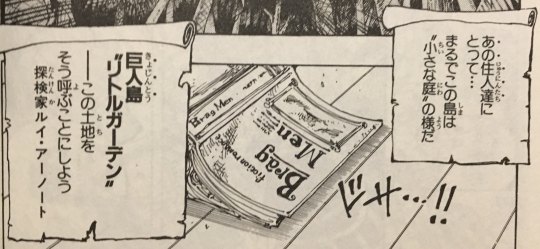
i’m a huge fan of the depth of in-universe lore one piece has. just having little details like this, quotes from books written in-universe, go so far towards making the world feel like a real and wondrous place with mysteries to be solved and details to be uncovered.
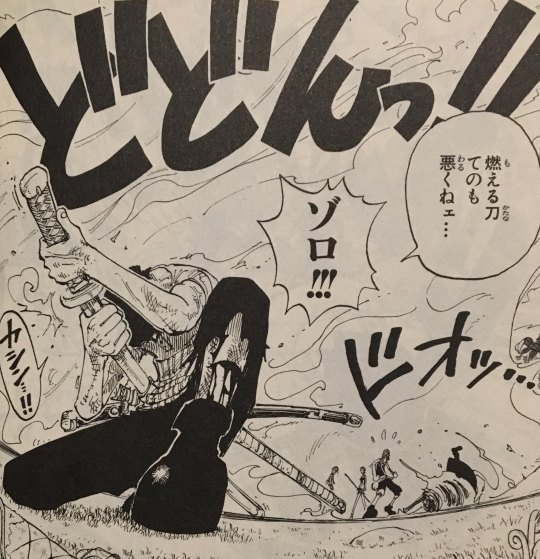
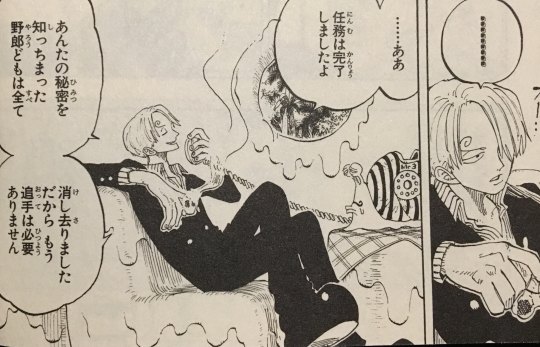
i still think sanji is firmly at his best when he’s being a sneaky bastard, and i will never cease to be delighted by how thoroughly he manages to fuck crocodile over with nothing but a phone and some quick thinking not once but twice.
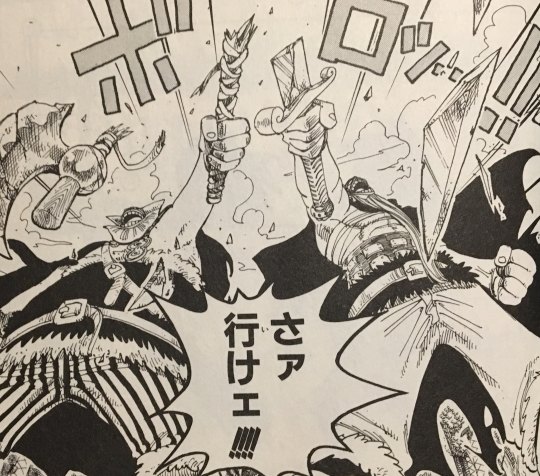
i really like dorry and brogy! for minor characters who’ve only appeared in one relatively minor and inconsequential arc so far, they’re not only very fun and memorable but also leave a hell of an impact on the story, not only in usopp’s new dream of eventually visiting elbaf but also in how they and their crew just keep coming up, first in enies lobby and then even further down the line in dressrosa and whole cake island.
i’m really excited for when we eventually get to reach elbaf, because this plot thread has been so thoroughly and subtly built up over such a long time that i can’t wait to see how it ends.
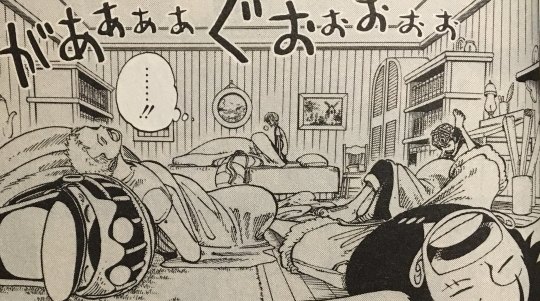
this is one of my favorite little moments to really drive home how much the strawhats care about each other. they all fell asleep on the floor rather than leave nami alone.
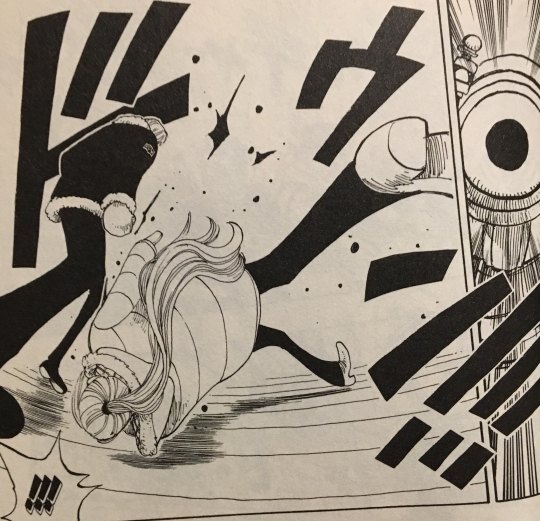
the whole introductory scene to drum is a really good summary of who vivi is as a person and how she contrasts with luffy, and it’s something i’ve written extensively about in a past meta. here ill just settle for saying, vivi is chronically selfless, and always the sort of person to sacrifice herself for others, and these traits which save the strawhats here are the exact same ones that bring her and luffy to blows later on in alabasta.
a good thing to remember when writing characters is that traits aren’t really inherently good or bad, they’re just traits and can have positive or negative consequences depending on the situation, and i think oda is really good at this. vivi’s selflessness, usually a positive thing, becomes reckless self-sacrifice when she’s pushed to her breaking point.
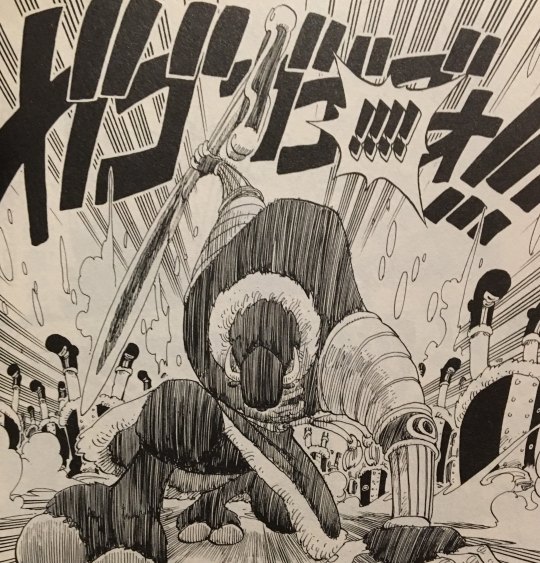
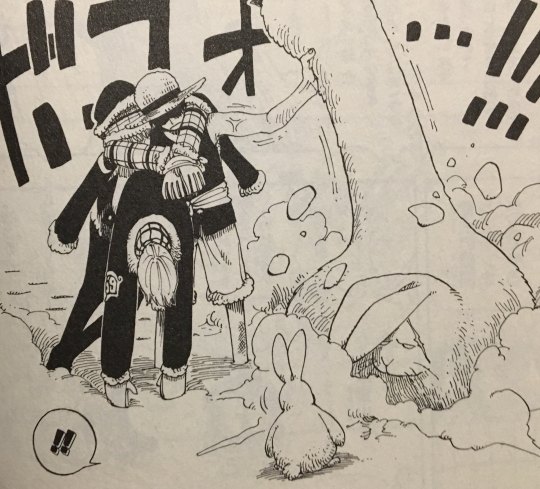
‘kindness begets kindness’ is a pretty consistent theme throughout one piece, though luffy is most often on the other side of it. someone (rebecca, law, tama, etc.) does something for him without really expecting anything in return, and gets paid back a hundred times over. this is a case of the opposite- luffy helps someone offhandedly, and is later saved by their gratitude.
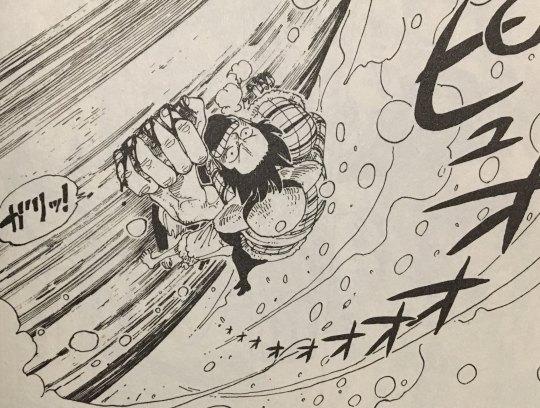
i think luffy wearing his fingers bloody as he climbs the drum rockies is the only time one piece has ever made me cringe back from the page. this sequence is absolutely brutal, and it’s so well-done.
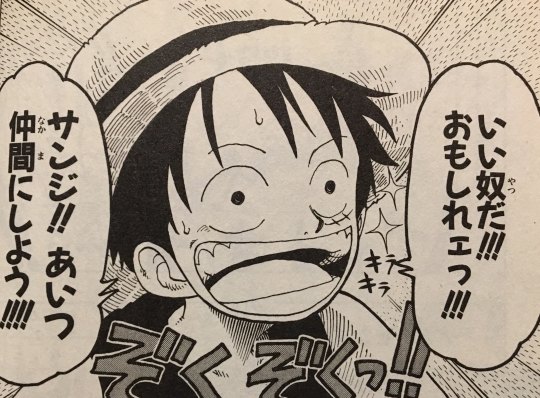
the way luffy decides chopper should be his crewmate is precious, and also reminds me a little of his recruitment of sanji (ironically, given he’s talking to sanji about chopper here). in both cases he sees someone do something good without even really knowing the full extent of their abilities and makes a snap decision that they are awesome and are gonna be part of his crew, no matter what they have to say about it.
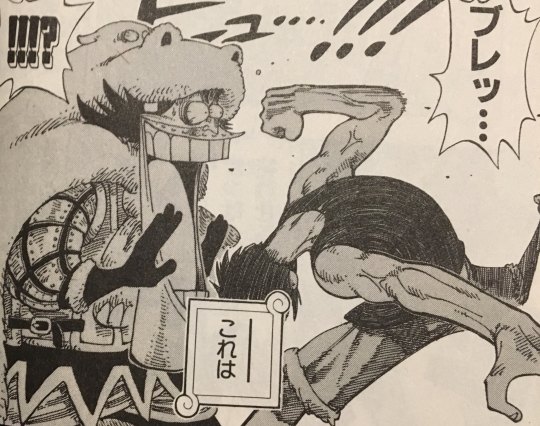
i really, really enjoy the way the drum island flashback is set up, with the cutaway right as luffy is about to punch wapol’s lights out. the cut back to that punch finally hitting when the flashback ends is by that point infinitely more satisfying, since you’ve just read chopper’s backstory and therefore have a deep and abiding desire to see wapol eat shit.
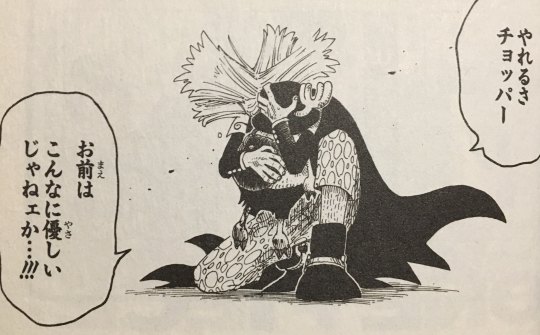
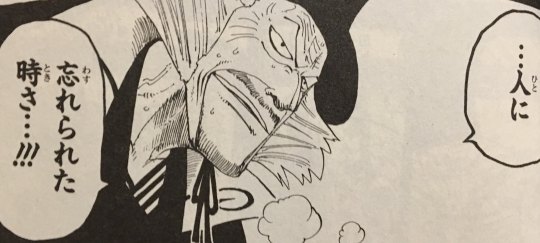
hiriluk’s final speech is definitely one of the best and most memorable quotes from one piece, and effectively the crux of one of its biggest themes. one piece is all about inherited will. all of our main cast and a solid percentage of the supporting cast bear the legacy of at least one forebear on their shoulders, from kuina to corazon to otohime. the entire setting of the story is defined by roger’s legacy.
all those people are dead, but they’re sure as hell not forgotten- how can they be, when their legacies are actively shaping the world as a direct result of their lives and influences?
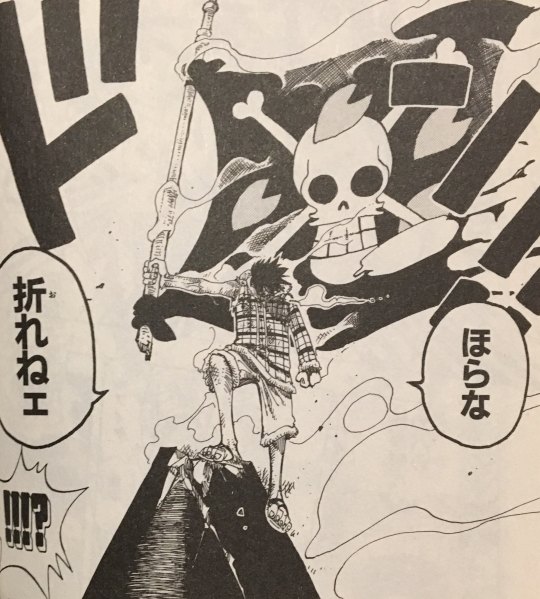
i really, really like the use of flags in one piece. flags are how you declare loyalty or war in equal measure, and flying a pirate flag is a declaration that you’re choosing freedom, come what may, over the laws of the world government. it’s just a really excellent running motif, and a great symbol of what one piece’s definition of piracy means.
this scene is also one of the ones that gets even more extra weight behind it when you know luffy’s full backstory with sabo, which i love.
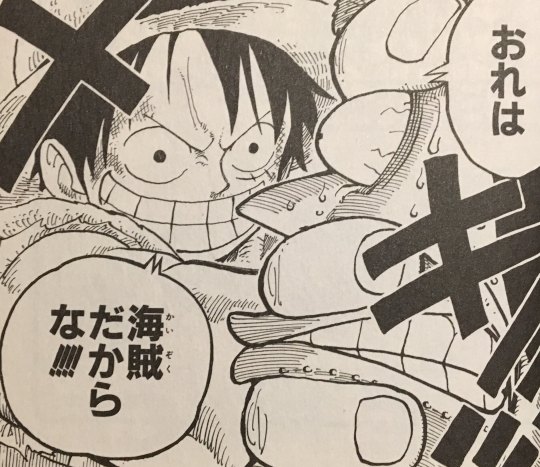
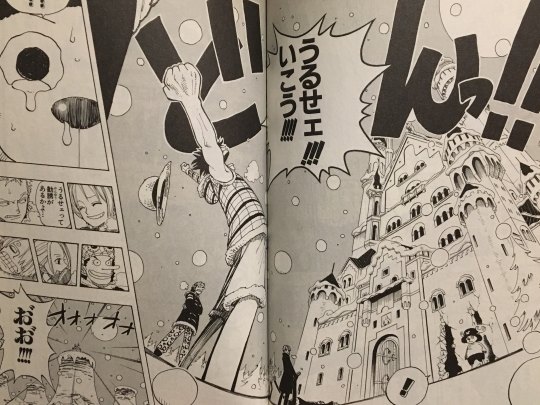
chopper’s recruitment scene sums up one of the reasons luffy is really great. he just doesn’t care about a lot of things other people would normally take notice of. occasionally that gets him in trouble, but other times it leads to him responding to a situation exactly right, like here. chopper is listing off all his insecurities and reasons he can’t go with the strawhats, and luffy just flat doesn’t care. he wants chopper on his crew and he knows chopper wants to be on his crew, so as far as he’s concerned, there’s no issue at all.
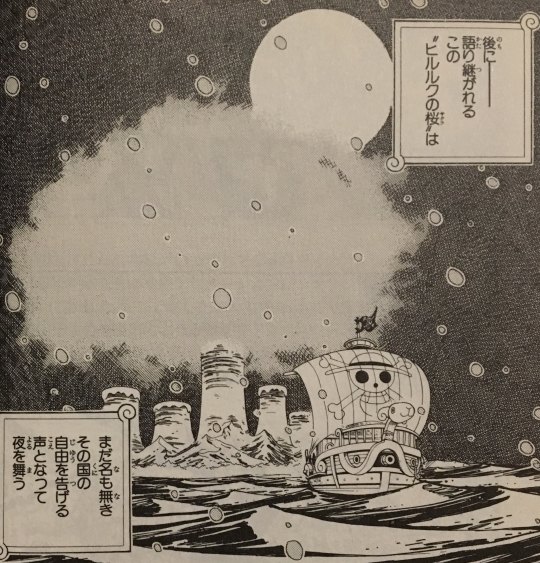
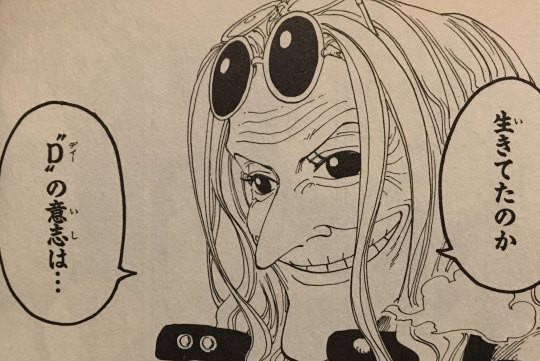
it really is wild that the will of D is named this far back in the story, and has consistently been referenced and built up ever since in very slight ways, through comments by characters like robin and corazon, and yet we still know basically nothing about it.
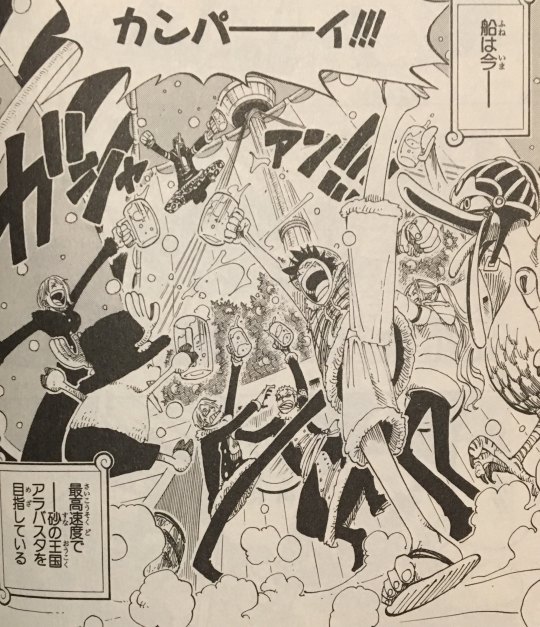
and a toast to a new crewmate!!
continued in the next post, which covers alabasta arc proper.
#the voyage so far#arc: reverse mountain#arc: whiskey peak#arc: little garden#arc: drum island#one piece#opmeta#not japanese#long post
150 notes
·
View notes
Link

This is a transcript of a speech by developmental biologist Dr Emma Hilton delivered on 29 November 2020 for the ‘Feminist Academics Talk Back!’ meeting. This talk was originally published by womentalkback.org
Sex denialists have captured existing journals
We are dealing with a new religion

Thank you for the invitation to speak today, as a feminist academic fighting back.
As ever, let’s begin with a story. And, trust me, by the end of this talk, you’re going to know a lot more about creationism that you expected:
1. In the 1920s, in concert with many other American states, the Tennessee House of Representatives passed the Butler Act, making it illegal for state public schools to: “teach any theory that denies the Story of the Divine Creation of man as taught in the Bible.” In other words, banning schools from teaching the theory of evolution.
Three months later, Tennessee science teacher John Scopes was on trial, charged with teaching the theory of evolution, a crime he was ultimately found guilty of. He was fined £71 – about £1064 in today’s money – so it could have been an expensive affair for him, had he not got off on a really boring administrative technicality.
Yet, despite the evidence against him and his own confession, he was an innocent man. Scopes was not guilty of teaching the theory of evolution. He admitted to a crime he had not committed. He even coached his students in their testimonies against him. So why would he admit to this wrongdoing of which he was entirely innocent? Why would he contrive apparent guilt? In protest. In protest against a law he viewed as fundamentally incompatible with the pursuit of scientific truth.
2. The history of creationism and education laws in the US is turbulent and often opaquely legalese, especially for those of us unfamiliar with US law. Some of the methods of the wider creationist movement, however, will be immediately recognisable as they are employed by a new movement, one which seeks to erase another scientific truth, the fact of sex.
Method 1. The framing of human classifications, whether it’s species or sex, as “arbitrary”. This leads to the premise that such phenomena are “social constructs” that need not exist if we chose to reject them. That truth must be relative and consensual. Never mind that these “arbitrary” classifications appear to be surprisingly similar classifications across all cultures and civilisations.
It also necessarily spotlights tricky boundary cases – not really a personal problem for the long-dead evolutionary missing links, but a very real problem in the modern world for people whose sex is atypical and who are constantly invoked, even fetishized, as “not males” or “not females” to prove sex classification is somehow no more than human whimsy.
People with DSDs have complex and often traumatic medical histories, perhaps struggling to understand their bodies, and they deserve more respect than to be casually and thoughtlessly used as a postemodernist “gotcha” by the very people so horribly triggered by a pronoun.
Method 2. The distortion of science and the development of sciencey language to create a veneer of academic rigour. Creationists invented “irreducible complexity” and “specified complexity” while Sex denialists try to beat people over the head with their dazzling arrays of “bimodal distributions arranged in n-dimensional space”.
Creationists, unable to publish in mainstream science journals because they weren’t producing, well, science, established their own journals. “Journals”. Sex denialists have captured existing journals – albeit limited to more newsy ones and to occasional editorials and blogs about gender (which is not sex), about how developmental biology is soooo complicated (which does not mean sex is complicated – I mean, the internal combustion engine is complicated but cars still fundamentally go forwards or backwards), about how discussing the biology of sex is mean (OK, good luck with that at your doctor’s surgery). Many such blogs and articles are written by scientists who simultaneously deny sex to their social media audience while writing academic papers about how female fruitflies make shells for their eggs (no matter how queer they are), about the development of ovaries or testes in fish and about how males make sperm.
The current editor-in-chief at Nature, the first female to hold this position, studied sex determination in worms for her PhD, and she now presides over a journal with an editorial policy to insert disclaimers about the binary nature of sex into spotlight features about research on, for example, different death rates in male and female cystic fibrosis patients.
The authors of the studies are not prevaricating or handwaving about sex, but the editorial team is “bending the knee”. I used to research a genetic disorder that was male-lethal – that is, male human babies died early in gestation. I’d love to know if this disclaimer would be applied there.
Method 3. Debate strategies like The Gish Gallop. This method is named for Duane Gish, who is a prominent creationist. What it boils down to is: throw any old argument, regardless of its validity, in quick succession at your opponent and then claim any dismissal or missed response or even hesitation in response as a score for your side. In Twitter parlance, we know this as “sealioning”, in political propaganda as the “firehose of falsehood”, although Wikipedia also suggests that it is covered by the term “bullshit”. So, what about intersex people? what about this article? what about an XY person with a uterus? what about the fa’afafine? what about that article? look at this pretty picture. what about what about whataboutery what about clownfish? The aim is not to discuss or debate, it is to force submission from frustration or exhaustion.
Method 4. The reification of humans as separate from not just monkeys but the rest of the living world. The special pleading for special descriptions that frame humans as the chosen ones, such that the same process of making new individuals, common to humans and asparagus, an observation I chose because it seems superficially silly – it could have been spinach – requires its own description, one that accounts for gender identity.
3. In the Scopes trial, which saw discussion of whether Eve was actually created from Adam’s rib and ruminations on where Cain got his wife, Scopes was defended by a legal group who had begun scouting for a test case subject as soon as the Tennessee ban was enacted. This legal group claimed to advocate for:
“Freedom of speech for ideas from the most extreme left such as anarchists and socialists, to the most extreme right including the Ku Klux Klan, Henry Ford, and others who would now be considered more toward the Fascist end of the spectrum.”
The legal group so keen to defend the right to speak the truth, in this case a fundamental, observable scientific truth? The American Civil Liberties Union, a group whose modern day social media presence promotes nonsense like:
“The notion of biological sex was developed for the exclusive purpose of being weaponized against people.”
and
“Sex and gender are different words for the same thing [that is] a set of politically and socially contingent notions of embodied and expressed identity.”
and shares articles asserting that biological sex is rooted in white supremacy.
Since the Scopes case, the ACLU have fought against many US laws preventing, or at least compromising, the teaching of evolution. I cannot process the irony of a group of people historically and consistently prepared to robustly defend the truth of evolution while now denying one of the most important biological foundations of evolution.
4. How do we fight this current craze of sex denialism? A major blow for creationism teaching was delivered in 1986 while the US Supreme Court were considering a Louisiana state law requiring creationism to be taught alongside evolution. The Louisiana law was struck down, in part influenced by the expert opinions, submitted to the court, of scientists who put aside their individual and, as one of them has since described “often violent” differences on Theory X and Experiment Y, to present a unified defence of scientific truth over religious belief. 76 Nobel laureates, 17 state academies of science and a handful of scientific organisations all got behind this single cause, and made a very real change.
Support for creationism has slowly ebbed away and the US is in a much more sensible position these days, although I still meet the occasional student from a Southern state who didn’t learn about evolution until college.
Sadly, one of the Nobel laureates has highlighted how unusual this collective response was and that he could not imagine any other issue that would receive the same groundswell of community support. Although he forged his career listening out for the Big Bang, so maybe I need to go through the list and find the biologists.
Part of the problem petitioning biologists to speak out is not necessarily fear of being cancelled or whatever, but simple lack of awareness of the issue, or incredulity that it is being taken remotely seriously. I’ve been working on a legal document and was discussing with a colleague about my efforts to find a citation for the statement, “there are two sexes, male and female”. He laughed at the idea that this would require a citation, told me to check a textbook, then realised that this statement is so simple that it would not even be included in a textbook.
And he’s right. I can find chapters in textbooks and hundreds of academic papers dedicated to how males and females are made, how they develop, how they differ, yet very few that feel the need to preface any of this with the statement “There are two sexes, male and female”. It is apparently something that biologists do not think needs to be said.
But of course, I think they are wrong, and that we live in a time where it does need to be said, where some aspects of society are being restructured around a scientific untruth, and where females will suffer.
Without recognition of and language to describe our anatomy, and the experiences that stem from that anatomy, mostly uninvited, we can neither detect nor measure things like rates of violence against women, the medical experiences, the social experiences of women and girls.
And, as for creationism, the reality of sex perhaps needs to be said by those with scientific authority, in unambiguous terms. Otherwise, we are living in a society that tolerates nonsense like there is no such thing as male or female, that differences evident to our own eyes are not real, that anatomies readily observable and existing in monkey and man alike do not actually exist. I’m sure this last assertion has the full support of the creationist community. And perhaps, as for creationism, a true tipping point will be tested when it is our children being taught these scientific untruths, or worse, when it is illegal to say different.
5. At the end of his trial, the only words Scopes uttered in court were these:
“Your honor, I feel that I have been convicted of violating an unjust statute. I will continue in the future, as I have in the past, to oppose this law in any way I can. Any other action would be in violation of my ideal of academic freedom—that is, to teach the truth as guaranteed in our constitution, of personal and religious freedom.”
I do not exaggerate when I say we are dealing with a new type of religion, a new form of creationism and a new assault on scientific truth. I also do not exaggerate when I say it may take a high profile court case to rebalance the public discourse around sex. There is only so far letters and opinion articles can go.
Two things I predict: 1. It will not be defended by the ACLU, and 2. With the recent proposals on hate speech law, it will probably involve a Scottish John Scopes, who finds themself in front of a judge for the seditious crime of discussing the sex life of asparagus at their dinner table.
Dr Emma Hilton is a developmental biologist studying aspects of human genetic diseases, and her current research focuses on a congenital motor neurone disease affecting the genitourinary tract, and on respiratory dysfunction in cystic fibrosis. She teaches reproduction, genes, inheritance and genetic disorders. Emma has a special interest in fairness in female sports. A strong advocate for women and girls, Emma tweets as @FondofBeetles.
39 notes
·
View notes
Note
I couldn’t finish Batman and Robin 2009. It was just... mentally exhausting and I stopped shortly after Bat Dick put fake Bruce in the Lazarus pit. Based on his appearances in Teen Titans, Bruce Wayne: Road Home, as well as his big fan base, I assumed Damian’s character development was executed nicely in his own series. But then again in Gates of Gotham (literally read it just for Cass) he’s impulsive, arrogant and rude to Cass both to her face and behind her back-even after she saved his life 1
Don’t get me started on the sexist things he’s said to Steph. I want to like Damian, but writers don’t make it easy. I got into comics because of batfam fanfics and he was a fave of mine. Dude was extra violent and displayed borderline sociopathic tendencies in his first appearances, cool beans. There’s a lot they can do with a character like that. I just felt like his bad behaviour was never properly dealt with before B&R, and I couldn’t muster the energy to see him through his own series. 2/2
IMO, Damian felt like a Gary Stu at times.
I don’t know if that last one was from the same person or not, but I just got the feeling it is, and if it’s not, then well it blends well enough and don’t feel the need to answer it separately.
Like all I can really say is that I don’t really like Damian. A lot of people confuse that for me thinking he’s an evil monster. I imagine cause I have a Tim icon and other Tims do rage on about that every now and again. As well as just plain taking things I say the wrong way (though I have probably said things in the moment I imagine). But I just plain don’t really like his writing, and if I can’t really read a comic he’s in that I actually like. Idk, I just find it weird to say I like him, when all I really like is what he could be. I don’t feel like that really equals me liking him, cause when I think about it, I kinda realized that meant the opposite, and didn’t wanna project the wrong idea.
But I wanna say this about Damian. He is insanely inconsistent as a personality and character. To this very day. So, as I do with every character, I start from the beginning, figure out what was meant to be by the writers that helped develop them, and figure out what’s in-character and out of character from there. I just feel like it’s the most objective way I can look at anything if I want to review things with standards that are more than just “I like this” or “I don’t like that”.
And in the case of Damian he’s never not been inconsistent. Like one of the main reasons I reread Batman and Robin (or at least Morrison’s run) was for plans of a post about flanderization in the Bat-Family, cause it was pretty rampant in the 00s and still continues often to this very day, and I think is the cause of a lot of lost sales and unhappiness and overall fandom diminishment.
However also to say it, I liked to see a lot of what Damian could be within B&R 09.
But anyways, basically just because I can’t really do a part of the post on Damian without trying to figure out what he was like to begin with, and what he was supposed to be per his creator.
Cause you can’t really tell in fandom. Cause his most popular comics are from stuff that isn’t in the main universe and was purposely a lot lighter, or in the main universe from writers that really surprisingly didn’t get the character despite the popularity--which continues my thinking on it was less about the quality of the writing and more about the lazy fan service. They honestly really flanderized him in a similar yet opposite way then what they did with Tim in the 00s.
And while I can’t act like the sexism and homophobia wasn’t an actual part of the character of Damian at the time--he shows both of those traits in the series (at least the homophobia, cause I’m now realizing that I might be thinking of another series for the sexism). He was flanderized even then by other writers from the different series.
Like how he’s written in Red Robin, is not freaking Damian. It’s not Damian to me. I don’t accept it as Damian. Even a lot of the content of him in Batgirl I even less feel like is Damian--besides unfortunately some of the sexist comments, but they never really proper developed him on that as far as like--actively showing that, at least that I can recall. So all I can really say is it’s uncomfortable, and how they don’t delve into it is the only real reason I say “That actually sadly does fit in with him”. But it’s not like it doesn’t make sense, he was raised to fight, not to handle emotions or feelings, he probably would do and say really creepy things when he has a crush--I just wish they’d actually acknowledge that what was going on rather than sacrificing a good story for more fan service.
The other writers make him too much of a bratty, snotty, kid. And I found that, that is an absolutely terrible interpretation of Damian, because beyond his origin, he isn’t a typical brat, and he doesn’t really act like a kid (in some ways yes, but general mannerisms and personality no). And even then he was a different kind of brat. He was entitled and bitchy in his origin, not immature (at least in the same way) and snotty. They have him act more like some spoiled brat from next door rather than a kid that was abused into being obedient to be what his abusive mother wanted (Talia shouldn’t be abusive, but like I said before, I think the series sucked overall for reasons like that and more).
(I also find that stupid line cutting scene in RR where I presume he was trying to kill Tim to be even stupider, cause Damian wouldn’t freaking do that at that point. They make Damian come off as so stupid in that issue, I hate it. Cause it was all just a cheap way to force sympathy for him, but it doesn’t even make sense when you think about it and is a huge stretch.)
Damian doesn’t make jokes when he’s written better--it’s like his thing. He’s got quite the temper, and understandably why of course. He’s violent with criminals, but he’s also mostly just stoic as his base state when not in a stressed situation, and even shows remorse (which is a big stretch from his origin, but I blame that on the writing which could be very rushed and lazy). He was treated like just another adult for the most part, and it had a weirdly endearing quality despite the maturity of it, and general edge of the series. It was Damian’s place and it worked really well. It just felt right for their dynamics. Damian’s a unique kid, and they respected him for who he was. He just needed help on his morals and stability.
But other series didn’t really get that. He would still be really rude like his origin, and not really the same tone of rudeness (I’m not sure if I can really explain what I mean by that), he’s aggressive, but putting him in Teen Titans never made sense to me, because I don’t see Dick doing that. Dick had a lot more respect than to force Damian to do something like that. Dick was more patient, and while he did lightly smack (not any kind to hurt him any. literally to demonstrate without pain. more taps really) him to teach him a point about aesthetical weaknesses in his costume like the hood, it was mostly done out of finding a way to teach him that would speak to him. So just forcing him to do something he didn’t want to do--which would clearly not work on him--was just contrived and plain bad writing wise. Something they did more as a stunt so they can say “TITANS NOW HAS THE SON OF BATMAN” than to use him well or continue his story in a natural way.
With Cass I can’t say anything, because that’s like the one time he talks to her, and that basically shows their dynamic. So that’s just them, I can’t really say anything on it. If he felt challenged by her I could see him being a total jerk. It really depends on the scenes themselves. I never read the series myself cause I genuinely really don’t like that Batman Reborn era of Bat-Family. Too much of it was just done for publicity and random changes, and for the most part didn’t work much to me.
But overall, at the same time, despite me singing the praises of what Damian could be, and was for a little while. The overall writing for the character arc was super lazy. Stuff just kind of happens, and way too quick to fit in with what they introduced. He just kind of goes “this is right, now”, which makes his whole brainwashing thing feel a bit--useless, and makes how he went from chopping heads off to that in very little time sort of cuts out depth that could’ve really made the series more rereadable. Damian actually comes off surprisingly as a very flat character for stretches of time in the issues because his character arc is never focused on as much as you’d think until they need to be like “Oh yeah...uh, here’s an emotional moment”. Which just felt really cheap to me.
So the series to me isn’t worth it if you want a good story. None of the stories were good to me, I think I was questioning each one cause it was either schlocky, out of character, or both. I know people like Grant Morrison, but they aren’t for me, I’m not a fan of their writing. Damian was a Gary Stu a lot, which they try to explain with the League thing--but having the League give him experimental surgery so he could walk the same day (or next) after being legitimately paralyzed was just way too freaking much to me. But he does make mistakes, so he’s not at base a Gary Stu really--the writing just really stunk badly sometimes.
This isn’t me putting in a bid to say “OH YOU JUST NEED TO READ THIS, AND YOU’LL FREAKING LOVE HIM”, because to be freaking honest, when you already have a bad taste in your mouth, it’s best to just wait a bit till trying again. I read the fandom recommended comics and felt there was so many problems that I couldn’t read Damian for literal months. And he still has a lot of the problems you said. I’m just saying Damian is surprisingly different when written by his creator than others, cause honestly nearly every single other writer for him has gotten him wrong. Like mind-blowingly wrong. He does not feel like the same character anywhere else. It’s nuts.
To put it another way, it’s a generally speaking bad series, but if you want to see what Damian was meant to be like before they kept regressing him, and diminishing him, and turning him into more a joke, and see what his dynamic with Dick and Alfred was meant to be like, it’s a brilliant and perfect series to read it for.
It’s better for learning about them--then it actually is to enjoy it. Because it’s most likely not a series I’m going to be returning too often unless to research something again.
15 notes
·
View notes
Text
Tangled Salt Marathon - The Eye of Pincosta

So this is an episode that really didn’t need to exist, and I say that as a Styalan defender. The writers took a perfect opportunity have the characters actually learn and grown and bypass it all for a contrived performative fake out redemption.
Summary: The group arrive in the town of Pincosta, but Eugene is immediately thrown in jail for having previously stolen the town's largest diamond, the Eye of Pincosta. The sheriff declares Eugene to work in the deadly copper mines and soon the rest of the group are thrown in jail. Rapunzel negotiates with the sheriff, offering to find and retrieve the Eye of Pincosta in exchange for Eugene and the group's release. The sheriff agrees, but on the condition that Rapunzel returns in two days. Rapunzel confronts Eugene about the theft and reluctantly, Eugene reveals he previously worked together with Stalyan, forcing Rapunzel to seek out Stalyan and persuades her to help.
So Why Didn’t Eugene Just Stay Behind With the Caravan?

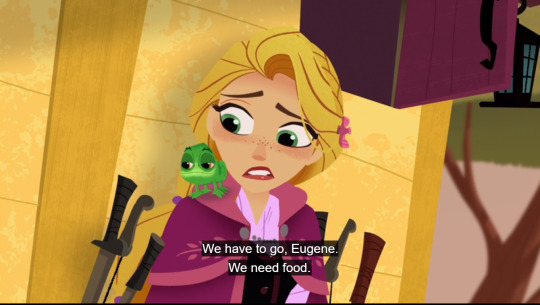
Like it doesn’t take all six of you to buy and carry food back to the caravan; which they don’t take into the town anyways. Especially when you have two horses you can use. So why bring Eugene along when you know he could be arrested?
Pointing Out the Flaw In Your Writing Doesn’t Make It Any Less of a Flaw
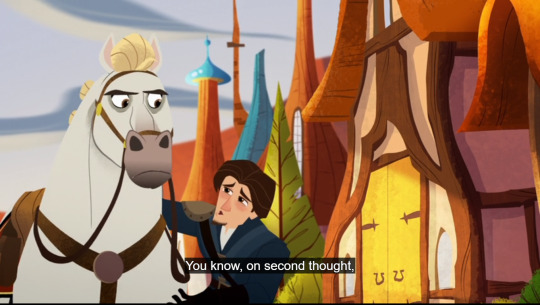
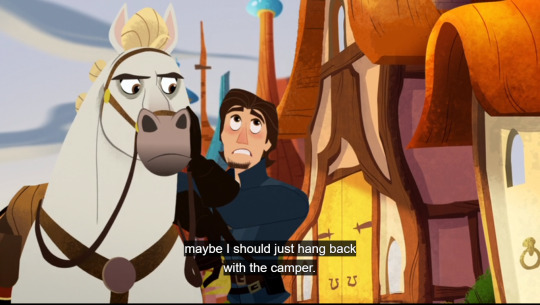
No seriously, why didn’t he stay with the caravan? You need someone to watch over your stuff anyways if your going to leave it behind and Eugene is the perfect candidate for that. And even if you did need everyone to stick together, which you don’t, then bring the camper with you and let Eugene ride inside of it unseen. It’s not like the towns roads are too small for it or anything and it’ll save you from having to carry your stuff.
If you have to turn your characters into sudden idiots for no discernible reason to make your plot happen then you haven’t a good plot. Start over and come up with something else. Like maybe have Eugene not realize that he is wanted here because it was so long ago or have the guards randomly check their caravan where he’s hiding out because Styalan’s back into town, or something. Anything so long as it doesn’t make the mains stupid.
You’re Literally The Princess of Powerful Kingdom; Use That!
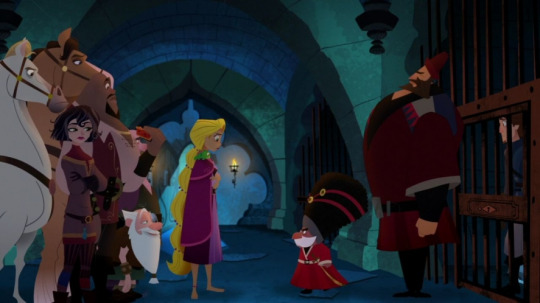
Ok, from what background info we get here, Pincosta isn’t even a fully fledged kingdom. It’s a hamlet, which is smaller than even a village. We get no indication what ‘land’ it belongs to, but it shares a kingdom with the larger town of Zulberg, which is one of the running gags in the first half of the episode.
What all this means is that Rapunzel is still the most powerful person in the room. She’s the heir apparent to the throne of a prosperous kingdom that has ties with a large trading network with bunch of other power kingdoms. Locking up her boyfriend and the future prince consort of said kingdom can be perceived as an act of war.
The series is trying to lead into Rapunzel becoming queen, but that means she needs to take advantage of her position and perform queenly like tasks. Like negotiating international incidents like this one, and simply complying to the city’s laws as if she was some random traveler doesn’t cut it.
Oh, So Now You Care!

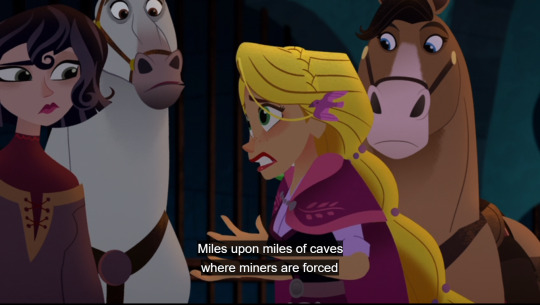
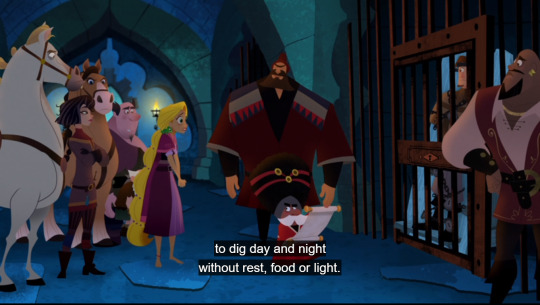
Rapunzel, where the fuck do you think that prison barge was heading to just two episodes back? The same prison barge that your friend Attila was being threatened with. The same prison barge that victims of Corona’s corrupt justice system, like say Varian, are threatened with on top of the inhumane conditions of those dungeon cells that you locked your two best friends in back in season one.
Do not tell me Rapunzel is some kind and caring person if she only gives a damn about unjust treatment when it only affects her or someone she already cares about.
This Is Stealing Agency Away From Eugene


Rapunzel is not the one responsible for Eugene’s mistakes. She can help to some degree, like using her political power to pull some strings, but she doesn’t need to be the one to make reparations for his actions; that’s on him.
Or rather it should be on him. This should be his episode. The one where he grows as a person as he makes up for past deeds. Because redemption isn’t just about never doing bad things again, it’s also about making amends for what you did wrong.
That’s where this series fails and why the whole ‘It’s Rapunzel’s Story’ mantra is hollow. For starters it’s not just Rapunzel’s story. The series isn’t structured to be that way because it’s based off of a movie with two protagonists. It’s Eugene’s story as well. It’s also Cassandra’s and Varian’s story because as the main antagonists they further the conflict.
But it also fails because Rapunzel is just thrown into other people’s stories instead of being given her own. Rapunzel never learns anything from this adventure. Stalyan does, and Stalyan is never seen again after this episode. Having Rapunzel teach other random people lessons is counterintuitive to what the series wants to be. If it’s meant to be a coming of age story where Rapunzel learns about the real world, then she can’t be automatically in the right every episode.
Well Ain’t That Convenient

So Stalyan is needed to find this diamond that she and Eugene stole in order to free Eugene. Yet it’s never stated how Rapunzel finds Stalyan, especially so quickly. Last we saw her she had just left Varados and that was months ago. She could have been anywhere by this time.
So why is she near the same town where she’d still be wanted for arrest at? Where’s a her dad, who was dying from poison when we last saw him? What has she been up to? How did Rapunzel even know she was here?
Like you need to establish crap like this, otherwise it’s just a major plot hole.
So Why Stalyan?
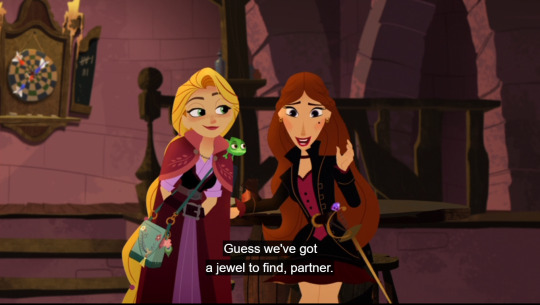
This episode could have gone to just about anybody. Eugene, Lance, Lady Caine, fucking Shorty... Like I’d even take Hookfoot over this. He’s at least there for more than two episodes.
So why Stalyan? Why does she get a focus episode when we’ll never see her again? How come she’s ‘redeemed’ but not any of the other criminals on the prison barge? Like the series wants to act as if Rapunzel is this really forgiving person who believes in second chances but only four villains out of twenty get redemptions. 4 out of 20! What makes Stalyan so special that she gets to be one of those few select four and not say Lady Caine, Dwayne, or Andrew and the Saporians?
This Should Have Been a Lance and Rapunzel Team Up Instead
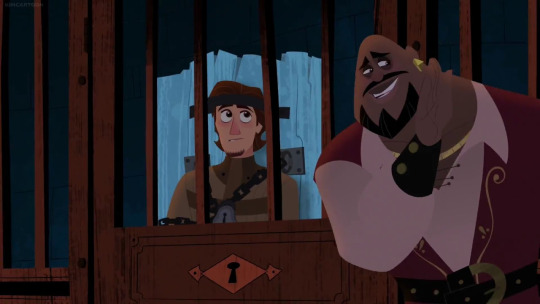
Keep in mind when I say this episode could have focused on anybody, I do mean it. You get creative enough this initial setup could have featured any two characters you wanted interacting. Lance and Eugene, Eugene and Rapunzel, Eugene and Stalyan, Eugene and Cassandra, Lance and Cassandra or maybe even Caine and Rapunzel, and reveal how Eugene knew Caine back in the pilot episode. Like there’s a lot of possibilities here.
For my money though, this should have been a Lance and Rapunzel episode. Because we don’t get any Lance and Rapunzel episodes. We don't even get any Lance episodes after his introduction. All his development, what little there is, is shoved into the b-plot of other characters’ focus episodes. He also barely interacts with the series main character despite being her boyfriend’s BFF and living with her on the road for year. That’s ridiculous.
All you needed to do was make Lance Eugene’s partner and have Lance make up for his past deeds to try and free his friends. Boom!
Why Didn’t You Bring Anything With You Raps?



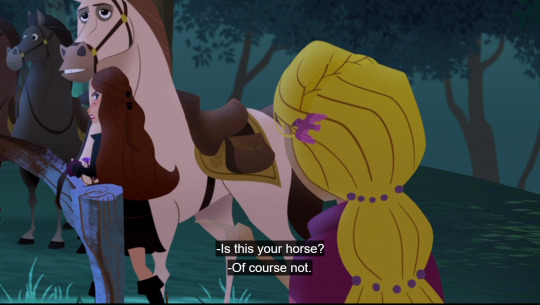
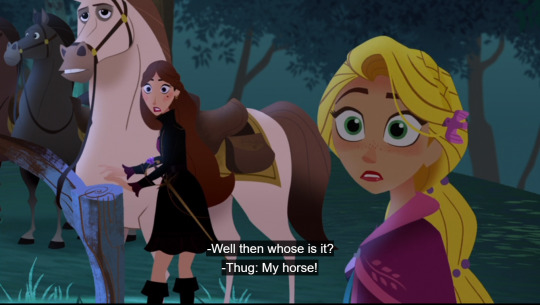


We see at the end that the caravan was parked outside of town this whole time. She still has the key to get out any money that she needed, the pick of two horses that can’t fit inside of a cell anyways, and oh yeah probably a canteen to use.
Furthermore, she’s a fucking princess!!! She’s has credit and clout and can just get whatever she damn near wants just by asking; because she’s not your average person on the street like us.
I’m not going to feel sorry for the main protagonist when the main protagonist is an idiot who does these things to herself and makes life harder for everyone needlessly.
Rapunzel Has a Stunted Grasp of Ethics

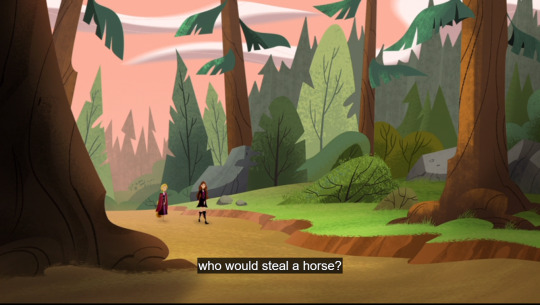

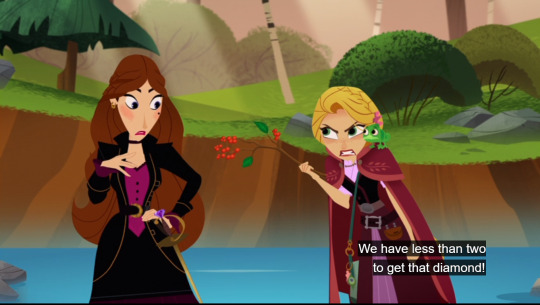
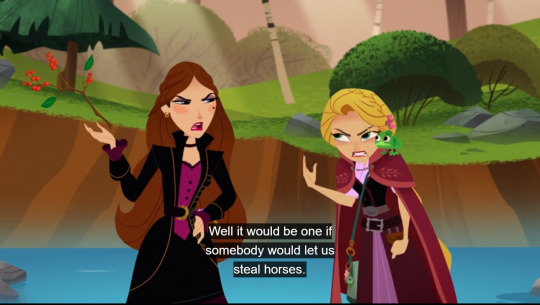
Stalyan’s not wrong here. Unless you have an alternative, like your own horse or money to buy horses, that you decided to leave behind as well for some undefined reason, then yeah, you needed horses. Your friends lives are at stake woman!
I touched on this back in my TAR review, but the show leans heavily into authoritarian beliefs because it provides childish lessons for adult situations.
‘Stealing is always wrong no matter what’ is the thought process of a child. It does not take into account how systems of governments can stack the deck against certain groups of people, nor how sometimes emergencies come up and you got to deal them in the moment and make amends later.
And you know what, I’m not taking ‘it’s a show for kids’ as an excuse here. Children shows very much can introduce comlex themes and grey morals and plenty already have. If you make classism a major theme of your story then you need to actually address it, and that starts by having your main character acknowledge it.
This could have been the perfect opportunity for Rapunzel to grow. Up till now she’s always had her physical needs provided for her. Since her escape from the tower she’s also been thoroughly spoiled. Have her come down off her high horse and see how the other half lives. See first hand what Eugene and the pub thugs had to do to survive before they met her.
Have her things actually be confiscated. Have her princess title mean nothing cause no one knows her or believes her. Have Corona not recognized in this part of the world. You want to be the underdog then make her an actual underdog and have her learn from it.
Because Rapunzel having the moral outlook of child makes sense given her backstory, but she can’t stay that way. We all have to grow up sometime, we all have to learn the harsher truths of this world, and this is suppose to be a coming of age story.
So How Does Stalyan Know Where the Eye Is But Not Eugene?


If Eugene is the one who lost it, then how come he didn’t know where it was at? Why couldn’t he just have told Rapunzel all of this and left Staylan out of the picture? Also how do you know if Goodberry even still has it if it’s been years ago? How do you know where Goodberry is? It’s awfully convenient that he never moved in all that time and that he’s so close to the town of Pincosta.
Once again, plot holes.
Stalyan is a Poor Man’s Sadira
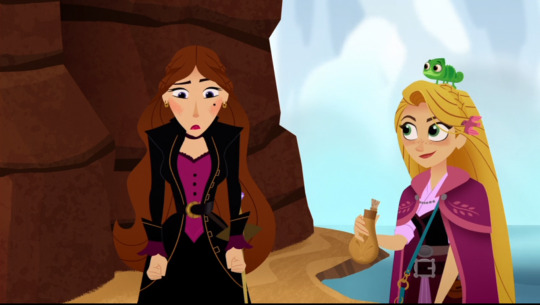
So for those of you who aren’t 90s kids like myself, Sadira is a villian from the Aladdin tv series. She’s basically Stalyan but done better.
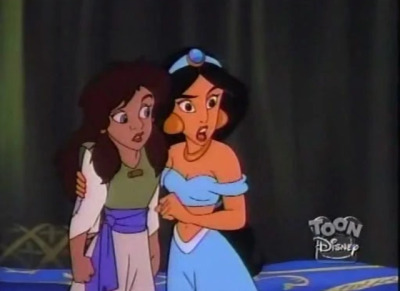
Things they have in common
their goals are to marry the main hero, who are ex-thieves
both are jealous of the main heroines who are princesses
both are thieves themselves and have lived their whole lives as such
both believe they belong with the hero because they come from a common background
both resort to dubious means to win the heart of the hero
both try to get rid of the heroines but never resort to killing them out right
both are redeemed and eventually befriends the princesses
You know what the difference between the two of them is?
Sadira is actions are actually worse than Staylan’s but she’s given enough screen time and focus to come across as sympathetic to the audience.

I’m serious. Stalyan is an ex who was left at the altar by her douchey boyfriend, but their relationship was so toxic that she can’t understand that she’s actually better off without him nor accept that he left her for someone else. So she tries manipulating him into coming back to her, while her dad does some messed up blackmail and poisoning that she didn’t agree to but went along with anyways.
Meanwhile Sadria is a straight up stalker. She doesn’t even meet Aladdin until after the events of the first film, and he makes it clear to her from the get go that he’s in a committed relationship with someone else and isn’t interested in her. But Sadria tries episode after episode to ‘win’ him resorting to mindwipes, kidnapping, and even alternating reality.
But we actually see things from Sadria’s perspective. It’s made clear that she has no one and nothing. Aladdin is the first person to show her kindness and so she latches onto him. Sure it’s unhealthy and the series calls it out as such, but by the time she has acknowledged this and befriends Jasmine the audience now understands her and feels sympathy for her.

We get no such focus for Stalyan. Not even in her redemption episode. We still don't know why she wants to be with Eugene after he’s treated her so badly. We still don't have any clue what their relationship was like before the breakup, or even when the breakup happened. (I still think it was during the events of the movie and that he left her for Rapunzel, but it’s left open) It’s hard to relate to or feel sorry for Stakyan when we know nothing about her and haven’t seen this ‘good side’ Rapunzel keeps talking about for ourselves.
Even though theoretically she should be very sympathetic because of the way Eugene treated her, and because her actions thus far are relatively tame compared to most of the villains in the show.
Just Because Other Places in the World Are As Bad as Corona, Doesn’t Mean That Frederic Is Excused For His Behavior

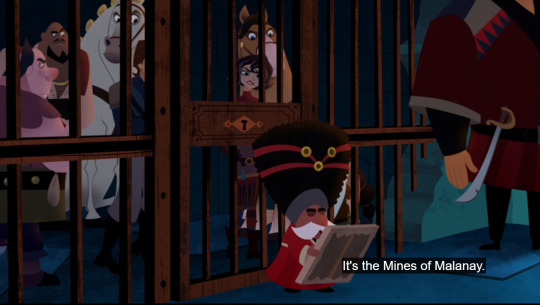

This show thinks it’s a okay to introduce horrible crap so long as it’s done in a comedic way and not focused on, but this isn’t The Office. You can’t use a corrupt legal system and authoritarians abusing their power as the crux of your main conflict in season one and then expect us to just laugh off jokes like this one. Or the one about tailor getting locked up for ripping Frederic’s robe. Or find young Lance trapped in a cell with Shorty being fed gruel as funny.
Like, even if you do laugh at these jokes at first in the moment, once you stop to think about them, it just shows how awful Frederic and Rapunzel are, how awful the system is, and that change needs to happen. But it can’t happen if Rapunzel and the show doesn’t acknowledge that such things are wrong. That they are more than jokes.
The serious story that the writers want to tell is undermined by the comedy, and the comedic moments are undermined by the existence of the more serious drama.
So is this a sitcom or a drama? It can’t be both, not when dealing with such high stakes.
Sitcoms work because they’re low stakes. Few characters are affected and most situations aren’t life and death. Even in dark comedies where death is often the joke, it’s because death is seen as unimportant, something to be casted aside, and it’s funny because it’s disrespectful. But the moment you call to attention just how messed up everything really is, and how awful death can be, then it’s suddenly no longer funny. Especially if it’s innocents who are getting hurt. Dark comedies also work because it’s often computuance for characters who are awful people.
That’s not what TTS is, so it’s attempts at being like It's Always Sunny in Philadelphia or Rick and Morty just doesn’t work and comes across as tone deaf.
Also why are the dang horses in the cell with the humans? They’re horses!
So What Exactly Is Stalyan’s Plan Here?

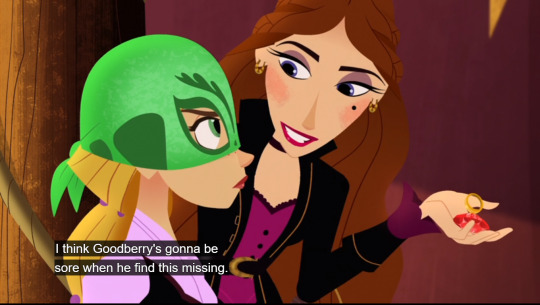
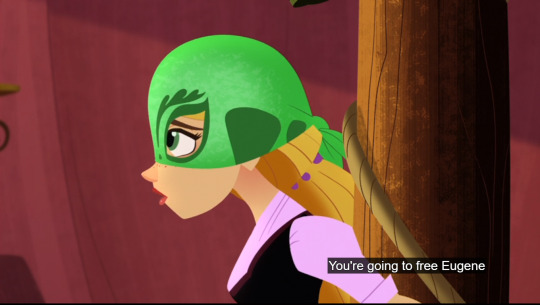
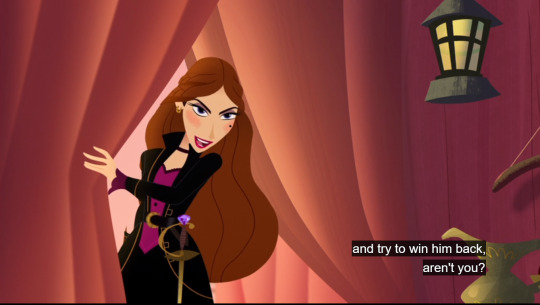

No seriously, what is her thought processes here? The audience isn’t mind readers. We need know why the characters do the things they do.
Why is Stalyan still hung up on Eugene? Why does Stalyan think he’ll take her back if she shows up to free him without Rapunzel? What is she going to say when he asks about Raps and why would he even believe her to begin with?
What does ‘A thief belongs with a thief’ even mean!!? We have no context for this cause we have no context for their relationship!
This episode could have provided us with some context, some cule of why Stalyan and Eugene were together for so long, why they broke up, why she still wants to be with him, why she thinks he’ll return to her even now, but nope! We gotta have a stupid parody wrestling match.

Oh joy.
This Is a Guilt Trip, Not a Redemption

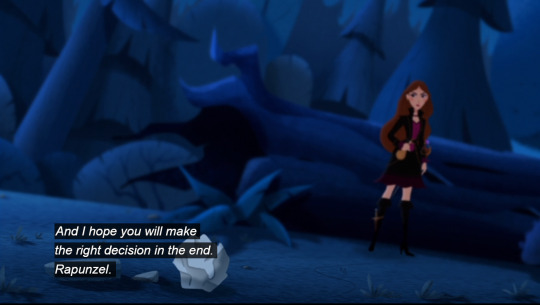
Rapunzel is full of shit.
If she honestly believed that there was ‘good in everybody’ then why did she send Caine off on the prison barge without even trying to relate to her? Why didn’t she try to befriend Weasel instead of fighting him off? Why is Varian currently sitting in a jail cell right now!!!
Here’s why Stalyan was ‘redeemed’ and not the others.
Rapunzel needed something from her.
Rapunzel guilt trips, manipulates, and coerces Stalyan into helping her. She doesn’t actually give a damn about whether or not Stalyan ‘does the right thing’ so long as she gets what she wants; Eugene’s freedom and his heart.
Sure Stalyan probably should turn away from her life of crime. She should let go of her obsession with Eugene. She should return the eye that she stole and start making up for her past. But you know what?
None of those things have anything to do with Rapunzel!
Stalyan needs to come to those decisions herself in order for this to be a proper redemption. If Rapunzel is involved in any of that then it can’t be with the condition that she’s gaining something from it. It’s not true compassion if you have an ulterior motive for what you do.
This Confession Might Actually Have Meant Something If We Had Any Actual Context!

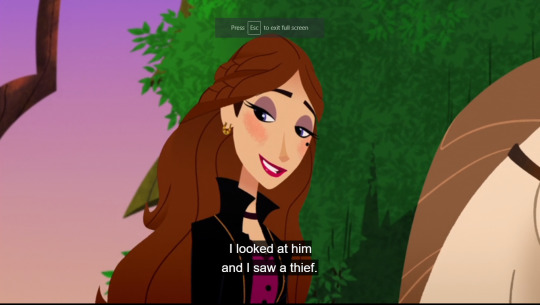
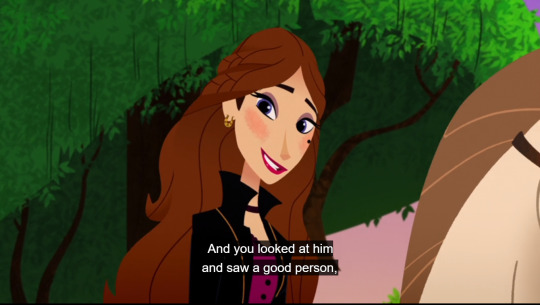
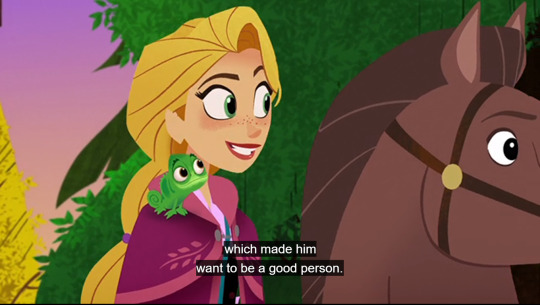
This doesn’t tell me anything.
Why would Stalyan only see ‘a thief’? She loved him enough to want to marry him and has known him for years. Sure she may have accepted that he was a thief, encouraged it even, but there’s got to be other reasons why she dated him. Other reasons for why she wanted him back.
Also why does this come back to Rapunzel specifically? Is she the reason why he left Staylan at the altar? And even so, why is that a reason to give Eugene a free pass? Is it just because she’s the protag and now they’re friends suddenly?
In fact if you are friends now, then Rapunzel deserves to know the truth of who she plans on marrying and come to the decision if he’s worth it. If he really has changed, not just in terms of being an ex-thief but also in how he handles relationships.
We the audience deserve to know too.
Redemption Shouldn’t be Tied to Friendship With Rapunzel


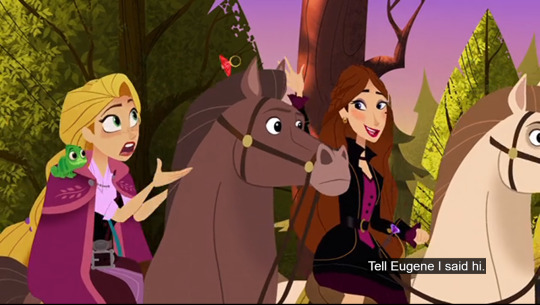
Eugene becoming inspired to be a better person because he fell in love with someone is one thing. Rapunzel only forgiving people because they’ll befriend her is entirely another. Especially when two of the main villains become villains after they stop being friends with her.
It sends out a really gross message of favoritism and not letting go of toxic relationships, while also placing Rapunzel too high upon a pedestal.
Rapunzel Can’t Forgive Stalyan In Eugene’s Place
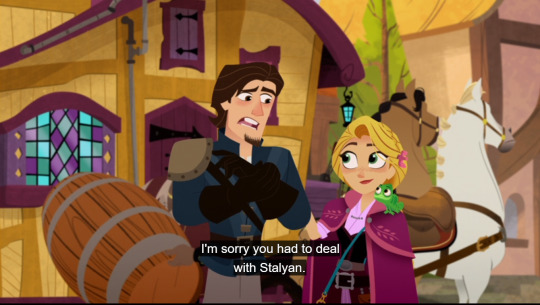

I’d be pretty upset if my current spouse just said that my abusive ex ‘was not that bad’.
Like, fuck both of you.
And yes, I did defend Stalyan in Beyond the Corona Walls, and I did say that we didn’t have enough context to claim she was abusive when they were in a relationship. After the breakup tho? Yeah, yeah she was abusive then. You don't have to be in a relationship in order to bully someone; you just have to have power over them.
Stalyan hurt Eugene, not Rapunzel. That’s why any redemption with her needed to be with him. They both needed to make amends, forgive each other, and move on.
This isn’t Rapunzel’s show.
If the creator wanted it to be her show then he shouldn’t have introduced conflicts that don’t actually involve her, nor characters with higher stakes then her.
This Doesn’t Feel Earned, and So the Audience Feels Cheated
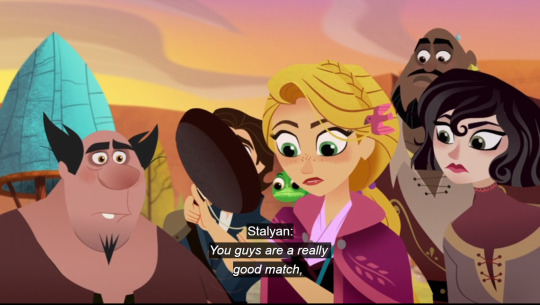


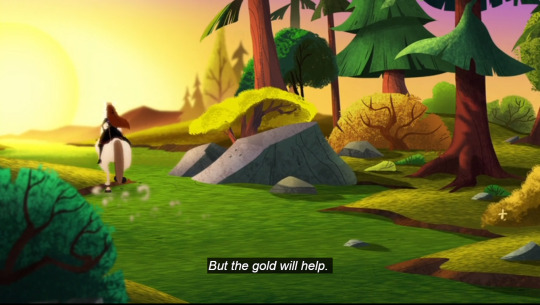
And so Stalyan rides off into the sunset rich to live happily ever after presumably as a thief still, and no one gave a shit.
No one was asking for this. No one cared about Stalyan. Worse the writer failed to make us care. Ergo this whole episode feels like a waste and it is.
Conclusion
Much like the rest of season two this is pure filler, and not even good fun filler; like with the mermaid episode or the pirate episode. Worse it’s very existence actually diminishes Rapunzel as a character rather than build her up. So it fails in its sole purpose as a story.
57 notes
·
View notes
Text
Wong’s Way (2011)
An anomaly in the cookie-cutter world of Cantopop, FAYE WONG has paradoxically found success by playing against the rules. Prestige Hong Kong follows her down the road less travelled
FIVE YEARS MAY not seem like that long, but it can be a lifetime in an entertainment industry that feeds off the right-here and the right-now. So it came as a surprise when, half a decade ago, Faye Wong decided to step back from the limelight and resume as much of a normal life as might ever be possible for a woman whose music has sold in the millions and who has combined that side of her existence with an acclaimed acting career.
From an existence playing before tens of thousands, what the Beijing-born Wong longed for at that point in time was a life tucked away in the peace and tranquillity of home – and after almost 20 years in the spotlight, and with her every move followed by a fan base that can be tallied in the millions, who could really blame her?
But as an artist who in an age of corporate conformity flatly refuses to play to any predetermined stereotype, Wong has always preferred to play by her own rules. It may come as a surprise, then, to find out that Faye Wong was not always “Faye” – diehard fans will remember a period in which the artist was known as Shirley Wong Ching-man, an affectation suggested by her record company early in her career, because of the stigma associated with the hip factor (or lack thereof) of mainland Chinese artists and names.
Even Wong’s early hits weren’t what you would call “original” – her first few albums were filled with formulaic Cantopop: collections of saccharine, predictable tunes that failed to properly utilise her delicate, lilting soprano. When she broke out of that shell in 1992, after a short travel hiatus, she finally found success, initially with a cover of a Japanese chart-topper in Cantonese, “Fragile Woman.”
Despite her disinclination to be impacted by her local contemporaries, Wong was not without her influences. She covered songs by The Cranberries, took quirky style cues from Björk and collaborated with the Cocteau Twins. The further she strayed from Cantopop, the more fame she found, penning her own songs and admittedly self-indulgent lyrics. She rapped on “No Exit,” yodelled through “Di-Dar” and even won the hearts of nerds by wailing the English-language title track to the hit video-game Final Fantasy VIII, “Eyes On Me.”
Even when her albums weren’t critical or commercial successes, her fame continued to grow, exponentially and uncontrollably. Her handful of acting roles, including in Chungking Express and 2046, showcased a curious, simultaneous aloofness and magnetism, an infectious, ravishing oddness.
In 2005, two months before she married actor Li Yapeng, she announced that she would take a break from show business. And so for five years there have been sightings, the occasional public appearance and the work for her own charity, but otherwise it’s pretty much been silence from Wong, as her fans – and the world at large – waited.
With that in mind, we should not have been surprised at the reaction to the news that Wong would finally be reemerging, to stage comeback concerts that started in Beijing last October, then took in Shanghai and Taipei before coming to Hong Kong, the place where Wong’s career was launched, for a series of shows in March. Tickets – for all nights, at all venues – sold out in a matter of days and the critical response has been overwhelming.
The headlines said it all: “The Diva is Back.”
What the Wong faithful have found is that their idol has lost none of the passion for the music that forms, as she puts it herself, part of her fate. They’ve been treated to nights filled with the songs that have formed the soundtrack for the lives of a generation here in Hong Kong – and beyond.
When Prestige Hong Kong found the interview-shy 40-year-old, she was in between shows and letting that fate take its course. What Wong wants the world to know is that throughout her storied career there has, she says, never been any real plan. She’s simply a woman who lets the cards fall as they may.
Can you talk a little about your return to the stage and playing live? What brought about the decision to play your recent concerts?
I consider this a natural move for me. I’ve been doing several commercials as well as releasing some new singles over the past few years. So this was a natural progression back to live performances. It’s all part of my career.
How did you go about deciding what form the concerts would take and the songs you played?
There’s no special form or arrangement that’s deliberately conceived for my concert. I believe my singing is the main source of interaction between the audience and me. Every show is unique and my mood is different, depending on the atmosphere. It’s not my practice to talk much with people or have any planned speech in my concert, because I don’t want the conversation to ruin the whole integrity and mood of the arrangement of the concert. I hope my audiences can indulge themselves with my music, while also digesting the message my show is delivering.
After the recent concerts in Shanghai and Beijing, what’s your feeling about coming back on stage?
It feels so good to see all my fans again.
Do you have any plans to work on a new album? If so, will you be writing songs yourself?
There’s no plan to work on a whole new album. But there is a possibility to release singles, and maybe I’ll write some songs myself.
How different to you is the experience of playing live now as compared to when your career began? What have you learned and how much has the experience for you changed over the years?
I’ve been working with different sets of crews, composers, producers etc since the beginning of my career. Each of these collaborations has opened up a whole new experience and been an amazing inspiration for me. Call it a fireworks feeling.
What was it that initially drew you to the music business? What was it that you found most exciting?
I believe singing is my destiny, and it’s fate that this became my career. I find it gratifying that I’m able to touch people’s lives with my songs. It’s a form of good karma.
Have your musical tastes changed or evolved as you matured as a person and as an actress?
I admire different types of music and things depending on the different stages of my life.
Did becoming a mother change how you approached both your singing and your career?
There was no change. I still sing with the same commitment and feeling, and it’s the same with my career.
And how much, do you think, did this change you as a person?
The process of raising a child is part of my evolution as a human being. If you’re not a parent or don’t fully involve yourself as a parent, you’ll never realise this traditional, fulfilling role of parenthood. As a parent, it’s natural to want to show your best side and provide the best example to your child. However, sometimes it’s hard to break habits that may surface from time to time. It’s a painful cycle, because even though you realise your own faults, to change yourself completely requires a lot of courage and determination.
We’re curious about a typical day for Faye Wong. What’s your routine when you’re not performing? What time do you go to bed, what’s your favourite meal and what activities do you share with your kids?
Basically, I go to bed and wake up the same time as my kids do. I got used to enjoying the regular pattern of a healthy lifestyle, but that won’t happen coming back to work.
Frankly, there’s so much to do when you take charge of a whole household. My life in the past few years was completely occupied by family and there was no time for me ever to feel bored. Sometimes I feel that I was even busier than when I was working as a singer.
Do you think your children share the same character as you?
When I look at my kids, it’s like looking into a mirror and seeing the deepest side of myself.
What are the things that make you most happy now, compared with when you were younger? What do you now cherish most?
I cherish everyone and everything. I’m fortunate to appreciate what I have and the people I know.
How do you see your image now? Are you an artist who is careful to control her image, or is it more a case of come what may?
The most effortless style suits me best. I aim to be the most natural, honest in my approach. I want it to be pure, not something that seems too contrived or created just to fit the latest trend.
What are you most passionate about?
To find the real meaning of life, and share it with lots of people.
What about acting? Is this something you’re keen to pick up again as well? If so, what kinds of films and roles might interest you?
Right now, I have no plans on filming.
What are the challenges you see ahead in the next few years? What can your audience expect?
My life has no planning, and I’m not a person who conceives everything in advance. It always depends on what’s being offered and what I feel like doing at that moment. There’s no pressure on myself – I leave everything to chance and fate.
The Smile Angel Foundation was founded in Beijing in 2006 by you and your husband, Li Yapeng, after your own child was afflicted with a cleft lip. It’s helped a lot of other children suffering from cleft lips and palates. Has the foundation changed your life or your character in any way?
My contribution to Smile Angel Foundation is not as much as my husband’s involvement. He’s very busy working on plans to support the foundation. For me, basically, I’ll attend annual charity events and activities to lend my support.
On this project, we started everything from scratch and are very gratified to see how much it has accomplished. My husband is definitely the driving force behind the foundation, and I really admire his passion, courage and capability.
At your current stage, do you think you have evolved in your perspective of things compared with when you were younger? Can you share your road of growth a little bit?
I was a bit stubborn, objective and capricious when I was younger. I’m now more willing to be open-minded and flexible, and always try to remind myself about this. It’s quite difficult to stop old habits surfacing from time to time.
But I’m trying hard to accomplish it.
Do you have any advice on how to maintain a woman’s beauty and charm after the age of 30?
First of all, you have to accept your age. I believe everyone has their own unique way to create their own charm and maintain their beauty, which is sometimes a very personal approach. One should find one’s own best way; there really is no standard formula for everyone to maintain their beauty. I believe the most natural side of a person is the most beautiful.
You’re acclaimed as a pioneer of alternative music. Does that mean you won’t compromise with the commercial market?
I never define my music as “mainstream” or “edgy” or “alternative.” I just do what I like.
Photography / Shameless Eye Production AG
Styling / Titi Kwan
Hair / Alain Pichon
Make-up / Zing
Wardrobe / Céline Spring 2011 collection
------------------------------------------------------------------
SOURCE: PRESTIGE HONG KONG
5 notes
·
View notes
Text
An Analysis of Armada Starscream’s Character Arc
So after reading @baebeyza‘s answer to an ask here, I decided I wanted to make a separate post sharing my view on some of the points made there, mainly the ones taking about Starscream’s character arc. Make sure to read that original post before going through this in order for this anything below to make sense.
This is all my personal interpretation btw, so feel free to agree or disagree as much as you want. Also, spoilers for Transformers Armada.
For starters, I’m of the belief that Armada is a mess in regards to writing up until the Unicron Battles act of the show, but Starscream’s arc was arguably one of the better parts of Armada IMO. Plus he’s one of my fave characters in the show. Thus, I’m going to analyze and provide my perspective on some of the things mentioned in the original post.
1.) The fight between Megatron and Starscream in “Rebellion”.
If you thought the fight between these two in this episode felt contrived, that’s because in-universe it kinda was. Remember Sideways? He was manipulating both Megatron and Starscream throughout that entire episode in order to get those two to fight to the death. He was successful in getting the fight to happen, but there was no death of one of the bots like he had hoped would happen.
2.) Thrust and Megatron’s plan in “Sacrifice”.
It’s true that Starscream had ownership of the Star Saber when the Decepticons finally got it their hands on it. That is, until Megatron had his Minicon Leader-1 trick him into attacking Demolisher with the sword in “Conspiracy”. The end-result was everyone agreeing that only Megatron should be allowed to wield the Star Saber, questioning Starscream’s competence. Ever since then, Megatron was the one in charge of the sword.
So why didn’t he want Starscream to have the sword? Simple: Megatron is an arrogant dick who is afraid of Starscream. Megatron sees Starscream’s confidence as a threat to his status as supreme Decepticon leader, and Starscream challenging him to that fight in “Rebellion” (despite his emotions being manipulated by Sideways in order to do it) is evidence of that fear being somewhat founded in Megatron’s eyes.
As for Thrust, he’s also quite arrogant, thinking of himself as the “best tactician”. Because of his perceived high-intelligence and ability to think of “great strategies”, Thrust believes that he’s better than any other Decepticon…including Starscream. The fact that someone so “below him” has the title of “second in command” doesn’t sit well with Thrust.
Basically, what you end up with are two arrogant people who either don’t like and/or fear Starscream.
The plan that Thrust makes is aimed to retrieve the Requiem Blaster, a powerful weapon which is currently back at the Autobot base. If they want a chance of breaking in, they’re going to have to lure as many Autobots as they can out of the base. In other words, they need a distraction. And because of their combined distaste for Starscream, Megatron and Thrust decide that he is the one that should be the distraction. I’m also guessing another reason to keep him in the dark was to keep the reaction as convincing to the Autobots as possible; sometimes being informed on the twist causes a less-convincing performance, and a convincing disguise was an important thing the plan needed in order for it to work. Thrust does imply that Megatron would have to give up the Star Saber for a time in order to ensure the retrival of the Requiem Blaster, which Megatron agrees to. Starscream only got the Star Saber in this situation because of that little tradeoff to make the plan work: distract the Autobots with the opportunity of getting the Star Saber back while the Decepticons invaded their base and grabbed the Requiem Blaster. And the mission does end up being a success.
This plan was definitely a gamble, as they could’ve easily lost the Star Saber and the chance to grab the Requiem Blaster, but it was one that worked in their favor, so all’s well that ends well. Who cares how Starscream feels about not being informed? Megatron and Thrust sure didn’t.
3.) Starscream, Alexis, and Sympathy
I’m also going to argue that while the messy writing can make it difficult to feel bad for Starscream, that doesn’t mean the potential to isn’t there. I personally have a lot of sympathy for him, even if his story wasn’t executed as well as it could’ve.
“Rebellion” and Thrust’s plan in “Sacrifice” are both driving forces for Starscream to join the Autobots, and a justifiable one IMO.
In “Rebellion”, Starscream gets beaten by Megatron for…no reason. Starscream followed Megatron’s orders exactly as he wanted. But because they lost the previous battle and Megatron can’t admit to being wrong, he blames the loss on Starscream anyway. Sideways says in-show that Megatron beating up Starscream for his own loss was absurd. And the abuse only stops when Demolisher blasts his way in and intervenes.
“Sacrifice” only furthers this mistreatment of Starscream, being used as a punching bag for the plan and getting abandoned without being informed about what was going to happen. This combined with the multiple times he’s been belittled by both Megatron and Thrust sends him over the edge, attacking everyone in the base when he gets back and eventually going to the Autobots for refuge and help to get revenge.
When Starscream arrives, the Autobots-especially Hot Shot-are reluctant to have a Decepticon join the folds so little after their dear friend Smokescreen almost dying by their hand. Hot Shot in particular is still hurt over Sideways’ betrayal. I’d argue those facts make for valid and understandable concerns, even if it results in some drama.
Regardless of their hesitance, almost everyone knows and agrees that having Starscream go back to the Decepticon base after attacking everyone there wasn’t going to end well for him. Thus, Optimus orders that they will let Starscream join their ranks (he’s a good dad).
Alexis was one of the first to suggest that Starscream join, and one of the first to attempt to get him to open up to cooperation with the team, probably because she saw potential in having him as an ally like Optimus did. Towards the end of the episode “Mars”, Alexis congratulates Starscream on a job well-done with getting the Minicon Firebot to join their side (praise ain’t something Starscream receives a lot of). Starscream scoffs and says he’s only on their side to defeat Megatron, but he leaves behind a moon rock, something that the kids had asked Jetfire and Starscream for earlier before going on a mission to Mars. I agree with Alexis in her conclusion that this is evidence of Starscream starting to change for the better.
In the next episode “Crack”, the kids award Starscream for his nice gift by throwing him a surprise party and gifting him a chamois. What stands out to me about this scene is that Starscream has no idea how to react. He’s confused because he’s not used to receiving many positive words of praise from his former Decepticon peers, much less a present.
He does push away help and positivity from the Autobots and the kids (to unintentionally hilarious degrees at times), but I think that’s partly due to the kind of impact his experiences with Megatron have had on his mind. He wants approval and acceptance, but once he starts getting it he rejects it. This is merely speculation from a psychological perspective, but I think Starscream has a hard time getting used to receiving kindness because whether consciously or subconsciously, he doesn’t believe he deserves it. The belittlement and mistreatment by Megatron has made him believe otherwise, and/or that every positive acknowledgement received always comes with a catch later on.
Yes, Starscream does return to the Decepticon fold later in “Crack” when Thrust convinces him that he has a better chance to get revenge on Megatron by coming back and conspiring with Thrust. But his short time with the Autobots and kids did impact him. He was extremely hesitant to fire the Hydra Cannon at Earth in “Threaten” and “Crisis” (even though he fires the cannon anyway after said hesitation), regretted the death of Optimus in “Remorse”, saved the kids from being killed by the Requiem Blaster (now in the hands of Thrust) in “Drift”, and stays behind to help Alexis retrieve her necklace safely (made from the moon rock Starscream gave the kids) in “Portent”. Starscream shows even after leaving that he has started to learn a little bit about compassion.
During the show, Starscream becomes a person who isn’t quite sure whom he should side with, as his personal goals contradict the overall goals of both sides. And how does his story end? He gets killed by Unicron, trying to convince Megatron (technically Galvatron now, but whatever) that Unicron is a real threat and that he needs to ally with Optimus and his team to defeat him. And his final words? Telling Megatron that he was a dick to him and that Optimus treated him better in that short time period than Megatron ever did.
Look, I get it. Armada’s a mess of storytelling. I wish there was more build up to Starscream defecting to the Autobots and coming back to the Decepticon fold. But we still got a pretty descent arc in the end, even if it could’ve been done better. I can’t make anyone feel sympathy for Starscream, but I refuse to deny that his story didn’t impact me or many others.
Starscream’s arc to me is the story of an abused bot trying to find his place in the world and not truly finding it in the end. It’s the story of a bot who dedicated every fiber of his being to serving his leader and getting nothing but shit in return. I feel bad for Starscream; he deserved so, so much better than what he got.
The thing about that chamois scene is that it had a longer impact on Starscream than the episode initially implied, as I mentioned in the examples above. I’m sure exchanging of gifts probably won’t mean much to someone who is used to getting and giving them. But to a bot who’s been abused by Megatron like Starscream was? That’s a fucking revelation. That’s new. That challenges his viewpoint of the world around him. If it didn’t, he wouldn’t have had second thoughts about firing the Hydra Cannon. He wouldn’t of saved the kids, he wouldn’t have helped Alexis with the necklace. He wouldn’t of helped Optimus convince Megatron to join forces and defeat Unicron.
Alexis was a firm believer that Starscream could be a better person and by extension get onto a path of recovery by showing him small acts of compassion and kindness at a time and celebrating those small victories of improvement. She wanted to be his friend because she recognized the potential he had. She recognized that Starscream needed support, needed a friend, deserved respect. That’s something he never got much of if any during his times as a Decepticon.
TL;DR Starscream’s character arc in Armada ain’t perfect but it’s still one of the best stories in the show that can impact you and I will forever stan him.
35 notes
·
View notes
Text
Brickclub 2.2.2, “In Which Are to Be Read Two Lines of Verse Perhaps by the Devil,” and 2.2.3, “The Ankle-Chain Must Have Been Worked On Previously, to Break at a Single Hammer-Blow”
I don’t have much to say about 2.2.2 that isn’t said by @meta-squash here or @everyonewasabird here, so since I’ve fallen so far behind this week I’m just going to skip to 2.2.3.
The opening digression on the cost of cannon salutes is still depressingly relevant, mutadis mutandis. I remember being reminded of this passage when I read Patrick O’Brien: part of what makes Jack Aubrey such an effective fighting captain is that he spends his own funds--money he often does not have--to buy powder and shot out of his own pocket, because the admiralty won’t pay for enough extra ammunition to let him drill the sailors effectively. The money spent on ceremonial cannon-fire isn’t just taking bread from the poor, it’s taking training and effectiveness from the navy itself.
That’s the only part of this chapter I would actually call a digression--the long passage on the Spanish war is pretty thematically integrated. Briefly--Spanish forces being mustered at Cadiz to go and retake the rebellious colonies of Spanish America mutinied, sparking a liberal revolution that ousted King Ferdinand; France went to war to restore him to the throne.
(The Siècle on the Spanish war: Episode 18 and a supplement on Thiers’ war reporting.)
The Spanish war was unpopular with the left for obvious reasons and with the Ultras, who feared the monetary costs, the likelihood for opening another ‘Spanish ulcer,’ and the likelihood of the French troops mutinying themselves.
Militarily, the French intervention put down the Spanish revolution with surprising ease--enough that the war was not even terribly useful for stoking nationalist fervor. “It seemed clear that certain Spanish officers whose duty was to resist yielded too easily,” Hugo says. It is not just morally correct for revolutionaries to fight to the last man, to hold their ground as we saw at Waterloo and will see at the barricade--it’s also useful. The French armies leave Spain with no joy in victory and a loss of respect for the Spanish; readers in 1862 would be aware that in 1832 (and the insurrections that followed), even the monarchists were impressed and humbled by the dedication and bravery of the dead insurgents.
As for the Bourbons-- “They did not see the danger that lies in suppressing an idea by decree.... The seed of 1830 was sown in 1823.” Quite literally, the July Revolution of 1830 will begin with the attempt to suppress ideas by decree, by muzzling the press. But also, 1830 kicked off with Charles X’s invasion of Algeria--a foreign war specifically conceived to whip up conservative sentiments at home to sway the elections to the Chamber of Deputies. As in Spain, it was a surprisingly quick and overwhelming military success--a punitive expedition to shake down the Dey of Algiers in response to a diplomatic insult ended in the unexpected capture of Algiers and the start of more than a century of colonial rule. And politically, it did not work--it was seen from the start as a cynical political ploy (where it wasn’t seen as a mask for mobilizing troops to turn against political opponents at home) and only galvanized the liberal opposition, who won overwhelmingly. (And when revolution broke out over Charles’ attempts to dismiss the resulting liberal Chamber before they had even met, as well as cracking down on the press, the most loyal third of the army was still in Algeria. Oops.)
So that’s the current political situation.
"An army,” Hugo says, in the middle of this discussion, “is a strangely contrived masterpiece by which force results from an enormous amount of powerlessness.” The unquestioning obedience--a weakness--of soldiers comes together to create strength.
In contrast--and I’m going to quote at length because this is such a lovely passage--
"A ship of the line is one of the most magnificent conjunctions of the genius of man and the power of nature.
A ship of the line combines both the heaviest and lightest of components because it operates at one and the same time with the three forms of matter, solid, liquid, and gas, and must contend with all three. It has eleven iron claws to grab the granite sea-bed, and to catch the wind in the clouds it has more wings and feelers than any flying insect. Its breath is expelled from its one hundred and twenty cannons as from enormous bugles, and proudly answers thunder. The ocean tries to lead it astray in the frightening sameness of its waves, but the vessel has a soul, its compass, that guides it and always indicates north. On dark nights its lanterns act as substitutes for the stars. So against the wind, it has rope and canvas; against water, timber; against rock, iron, brass, and lead; against darkness, light; against immensity, a needle.”
In the ship, as in the army, small and weak things come together--ropes, lanterns, a needle--to create great strength. But the army wages war “by humanity against humanity despite humanity”; the ship contends with Nature, against which--as Hugo goes on to tell us--it is still immensely small, and can easily come to ruin.
Or, if it is lucky, to the drydock at Toulon, where it is gawked at by another of Hugo’s crowds: “Whenever immense force is deployed and ends up as immense weakness, men’s imaginations are stirred.” So the ship is also the opposite of the army--weakness created from the merging of strengths.
So, there’s a lot going on here. Going back to that line at the start of the passage--”one of the most magnificent conjunctions of the genius of man and the power of nature.” Possibly, after Waterloo, I’m seeing the Providence/Nature vs Fatalité/Man antithesis everywhere, but I think it is echoed here. If Waterloo is what Providence could create out of the threads of human choice, human fatality, in order to set itself right, the ship might be a model of what human choice--human genius, which is a phrase Hugo uses several times in Waterloo in contrast to Providence--can make of what Nature gives it: the sea, the wind, the magnet.
By that logic, the ship should be what humanity uses to set itself right. But if the ocean is still Society--that thing which is not quite humanity, but is of it--the ship is where the Man Overboard falls from; it’s human progress, humanity setting its own course. It’s functional institutions, legitimate government, networks of care.
And, moving back to the level of plot, we see a specific ship, a real man, overboard into a real sea--and Jean Valjean, whose presence immediately makes it clear why we’ve just spent all this time talking about the intersection of great strength and great weakness.
His name isn’t confirmed until the very end of the newspaper article that ends the chapter, but that is his name now. He is Jean Valjean, who combines the immense physical strength--and social deference, as we’ve just seen again in Boulatruelle--of the convict 24601, now 9430, with the social and legal knowledge, the wealth, and the unprepossessing façade of the bourgeois Madeleine. Valjean never successfully made an escape as 24601--to make this one he needed the skills he learned on the outside, the ability to wait, to plan for the future, to even imagine a future, just as much as he needed his strength. The chapter title says it all--he prepared the shackle, so he could break it with one blow.
Fursona Watch: Valjean climbs the rigging “with the agility of a tiger-cat.” Tigers are the one feline that’s not uniformly positive in this book, and the only one associated with Javert.
On his way down to the struggling sailor, he looks “like a spider coming to catch a fly, only in this case the spider brought life, not death.” I think--as with Waterloo, and as with the ship, which also keeps people out of the ocean--that here we start to see Valjean as Fatalité in the service of Providence. We’ve seen Providence suddenly arrogate his choices to its own ends--starting with the purchase of his soul, after he rejects the softer path to humanity that the bishop offers him. Now he’s offering them up freely--creating, out of renunciation and self-abnegation, great power. And he’s basically Spider-Man, because we know what comes with great power.
#brickclub#lm 2.2.2#lm 2.2.3#i am not saying that Hugo literally anticipated Spider-Man#i am saying I would give a LOT to read a Spider-Man comic by Hugo#even though it would start with 20 issues of Uncle Ben's backstory#and no one would ever forgive Hugo#or honestly#Peter Parker#for letting him die
6 notes
·
View notes
Text
The Road To “Godzilla VS. Kong”, Day One
KING KONG VS. GODZILLA (AMERICAN VERSION)

Originally Released: June 26th, 1963
Director: Ishiro Honda
Writers: Shinichi Sekizawa, Paul Mason and Bruce Howard
Starring: Tadao Takashima, Kenji Sahara, Ichiro Arashima, Mie Hama, Michael Keith, Harry Halcomb
youtube
“King Kong VS. Godzilla” is a movie whose reputation often precedes it amongst certain circles of Genre Film fans. Even if one is unaware of the convoluted, more than slightly seedy story behind its creation (short version: the original “King Kong”’s special-effects artist, Willis O’Brien, was interested in creating a sequel that would have pitted Kong against a giant animalistic version of the Frakenstein Monster, but shady producer John Beck wound up stealing the idea and, when American studios balked at the project for fear that the use of stop-motion animation to realize the effects work would be too expensive, wound up shopping it to the more cost-effective Toho Studios in Japan, who reconceived it as a new “Godzilla” project in hopes of revitalizing interest in the character), it is still one of the most singularly important Giant Monster Movies ever made. For one thing, it basically defined The Kaiju Movie as we know it today; sure, the original “Gojira” from 1954 (and by extension its Americanized adaptation, “Godzilla: King of the Monsters” in 1956) may have effectively created the genre, but you’ll notice the majority of such movies that exist today are more about Fanciful Title Bouts between two Clashing Monsters rather than somber moody Allegories about the horrors of Nuclear Weapons. For another, it’s the movie that really put Godzilla himself on the map as a Big Star in his own right; at the time, he only had two prior films to his name, and while one of them was the aforementioned genre-creating watershed “Gojira”, the other was “Godzilla’s Counterattack” from 1956, which proved such a box-office disappointment that it put the character into retirement for the better part of a decade (and to give you a sense of just how much less weight the name “Godzilla” carried back then, when that movie was released in America in 1959, it was initially re-titled “Gigantis The Fire Monster”). With “King Kong VS. Godzilla”, however, he would begin to star in more and more movies, building a film franchise that continues to this day.
So it’s a bit of a shame that I’ve never liked it all that much.

To be clear, the “it” in question here is specifically the American version of the movie, which is the one most Western audiences would be familiar with since, until recently, it was the only one readily available to us (though Criterion finally corrected that back in 2019, when they included the original Japanese version of the movie as a bonus feature in their “Showa Era” collector’s set). Certainly, it’s the one that I grew up watching as a kid, when my mom, ever so protective and knowing how easily upset I could be when Fictional Characters I Loved got hurt, made sure to watch ahead to see who exactly won the title match-up (and since it was Kong, I wouldn’t actually get around to finishing my viewing of the movie for a good long while). Back then, of course, I viewed it very much through that childish prism of who I thought should win, and it was exactly the kind of Schoolyard Logic you’d expect: Kong was supposed to be a great deal smaller than Godzilla, and where Godzilla had his iconic fire breath, Kong had no extraordinary powers; Kid Me understandably concluded that this match-up really ought to be a shoe-in for Godzilla, which worked out well since Godzilla just so happened to be the one Kid Me actually cared about. Kid Me was thus quite irritated to discover that, for the sake of this movie, Kong had in fact been significantly sized up and given random electricity-absorbing powers. It felt like cheating to Kid Me, and it left me less than positively disposed towards the film proper.
These days, of course, I’m able to give the film a somewhat fairer shake, though I would be lying if I said that My Inner Childish Fan-Boy is completely quiet on the matter (in particular, it always bothers me that, to emphasize the advantage Kong’s electrical powers give him in their fight, the movie explicitly cites Godzilla’s “vulnerability” to electricity, despite one of the most singularly iconic images of the original “Gojira” being his ability to walk straight through a power-line barricade). Indeed, my most recent re-watch for this very review honestly left me feeling fonder toward it than I was even on my last most recent re-watch (back in 2014, in preparation for the then-upcoming Gareth Edwards “Godzillla”, which we’ll also be getting to in this re-watch soon). The portrayal of the title monsters themselves in particular left me much happier this time around than it has in the past; the design for Godzilla himself- thick around the center with big heavy-browed eyes and what appears to be a constantly self-amused grin, huge sharp claws that dominate the fingers and a tail that moves with a real sense of weight and purpose-took me a long time to warm up to, for example, but these days I would happily cite it as one of the very best of the original series. Kong gets it a bit worse, sadly; the suit they design for him here (a fact that original “Kong” director Merian C. Cooper openly despised, incidentally; the idea of portraying Kong as just some guy in a gorilla costume was one of the things he explicitly set out to avoid in the original movie) has a distinctive enough face if not an especially memorable one, but the costume always looks and feels a bit raggedy, with the sagging pecs and ill-fitted arms (throughout the movie the suit switches between “regular” arms designed to allow the actor mobility, and extended arms to help give it a more ape-like gait; the result is that both versions feel weirdly out of place on the costume a lot of the time) looking especially awkward. However, even beyond how they look, the way the monsters act is genuinely enjoyable, with Haruo Nakajima as Godzilla and Shoichi Hirose as Kong both putting in fantastic performances that imbue them with a great sense of personality that is just consistently delightful all movie long. Whether it’s Godzilla hopping around, arms flailing in triumph whenever he manages to pull off another victory, or Kong drunkenly swallowing up giant pots’ worth of a narcotic usd to keep him docile, the movie very visibly delights in imbuing these creatures with fun foibles, and It’s no coincidence that the it’s at its strongest, not so much when the monsters are fighting, but when they are simply interacting as actual Characters: Godzilla here feels often like a particularly arrogant, boundlessly-energized child, while Kong is a bit more confused and subdued but quick to anger when irritated; their first meeting, when both these strong visible personalities most openly bounce off each other, is unquestionably my favorite moment of the movie.
The rest of it isn’t exactly bad, per se, but it is a lot less entertaining. Some of that is simply what the American version inherited from the Japanese original, not least of all the noxiously racist portrayal of the Natives living on a remote pacific island with Kong (here named “Faro Island” for some reason instead of the usual “Skull Island”). On top of the sins it recreates from the original “King Kong” (a fairly ooga-booga understanding of What Islanders Are Like, all of whom are portrayed by non-Native actors slathered in brownface make-up), it also includes a decently insulting bit wherein the initially-hostile islanders are pacified by the introduction of “magic” in the form of a hand-held radio and cartons of cigarettes. There’s also the fact that the plot is driven almost entirely by Random Contrivance rather than anything that flows naturally from either the characters or the premise; Godzilla and Kong have no real compelling reason to meet, let alone fight, other than the pure coincidence of their both happening to be active at around the same time in the same part of the world (the American version attempts to ameliorate this somewhat by stating that the two are “instinctive rivals” who will be “naturally driven to destroy one another”, but that flimsy lip-service to Motivation just winds up making the otherwise-arbitrary plotting feel all the worse), and we are constantly bombarded by Total Coincidences as a way of shuffling the characters around from place to place with dizzying frequency. But some of those troubles are only exacerbated by the approach the American version has taken to the material. We’ll talk about this more tomorrow, but the Japanese “King Kong VS. Godzilla” is, at heart, a Satirical Comedy; this, unsurprisingly, was not an idea that went over well with Universal Studios in America, who chose to try and reshape that comedy into a more traditional Monster Movie. An understandable objective, but not one the Japanese cut of the film made easy to achieve; to avoid the most overt Comic bits meant cutting almost all of the human characters in the film (most notably the eccentric executive Mr. Tako, played by Ichiro Arishima) down to only their most essential appearances, which in turn means that they all wind up feeling vaguely undefined and out of place in their own story (this feels especially true of our ostensible main character, Tadao Takashima‘s Sakurai, who is present enough to FEEL like a main character but has little left to do in this cut of the film). To make up the weight of all that cut footage, meanwhile, we get gobs of new footage consisting mostly of Michael Keith as a United Nations reporter talking at us in the most stultifying way possible, often joined by Harry Holcombe as an equally stultifying scientist (who apparently gets his knowledge of dinosaurs primarily from children’s picture books, which in fairness would explain a lot of the nonsense he ends up saying), though he also frequently talks with a fellow reporter played by James Yagi. These scenes are not, perhaps, without their charms, but they also deaden the movie’s pacing, especially since nine times out of ten they exist mostly to reiterate stuff we already know because it literally just happened. Given how much a faster pace seems to be one of the American cut’s top priorities (a sub-plot from the Japanese version about a submarine inadvertently encountering Godzilla is reduced to a single sequence for this version), that choice proves a counterintuitive one.
Because the other major problem with the American approach to this movie is that, to be frank, the Monster Action is nowhere near Epic enough to bear the weight this new cut puts on it. Again, it’s not without its merits; Godzilla and Kong’s outsized personalities do a lot to lend even the less effective sequences a certain fun spirit, and there is still an unmistakably strong sense of craftsmanship to the miniatures used throughout the movie to create the appropriate sense of scale for our Monsters to play around in (the demolition of a recreation of Atami Castle shines a spotlight on that very fact). But in terms of both their scope and their choreography, there’s just not enough There there; far too often, “King Kong VS. Godzilla”’s Big Marquee Action Scenes amount to the monsters just sort of lazily throwing rocks at each other, or else engaging in less-interesting recreations of their previous Iconic Moments (Kong especially goes through a truncated version of his original appearance’s third act, though here he ends up on top of the National Diet Building rather than the Empire State Building). That’s slightly less of a problem in the Japanese version; again, there, the main thrust of the film lies in its comedy, and thus the Monster Action being relatively lightweight is less of a hinderance and more a spicy Flavoring to the main story. But here, it is the main story, and while it’s pretty clear some real love went into the Effects Work (the puppetry especially is very solid; there are a few instances where the switch from Suit Actor to Puppet for Godzilla is borderline seamless, and I also enjoy the decently-animated feel of Kong’s facial puppet as well) it ultimately doesn’t have nearly enough substance to fill that role. This comes through especially clearly in the Final Showdown between the monsters; again, there is some deservedly iconic stuff here (Kong trying to shove a tree down Godzilla’s throat only to have it rebuffed in a puff of flames has become an impressively-enduring Meme for a reason) but, much like most of the story, winds up being driven far more by Contrivance than anything clever or satisfying (a bit where Kong knocks himself over feels especially annoying for how unmotivated it seems to be). It was always going to be a tall order to make a match-up with as much implicit weight to it (both metaphorical and literal) live up to the heightened expectations placed on it, maybe. But even taking that into account, it’s hard not to feel like “King Kong VS. Godzilla” could have put a little more effort into things.
Still, I was saying, at the start, that I walked away from “King Kong VS. Godzilla” happier this time than in many of my past viewings. And that is ultimately true: for as much as I find myself often wishing it could be a different movie, the movie it actually is already does manage to work decently well on its own terms. The dub-work here in particular honestly deserves notice; in contrast to the standardized casts Toho would start using for most of its “Godzilla” movies moving forward, here we get a more distinctive sounding voice-cast who manage to put some real Life into their performances (the voice they give to Kenji Sahara’s Fujita stands out especially to me, nasally and over-earnest but capable of some real Fire when the moment calls for it, as befits the character). And, again, whatever my beef with the Action Scenes, the actual portrayal of the Monsters really is uniquely fun (indeed, given how many other elements Toho would consistently crib from it, I’m often surprised that Godzilla’s distinctive body language throughout isn’t one of them), which winds up giving the movie enough Real Heart in the end to make it a positive Experience overall, even against the stuff that even now stands out to me as Not Up To Snuff. At the very least, it’s a lot easier for me to recognize how and why this movie created the Legacy it did, even if the American Version makes a bit more of a mess out of it.
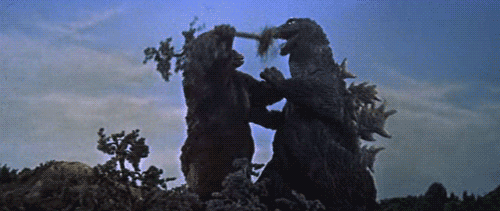
#godzilla#king kong#godzilla vs. kong#kaiju#theroadtogvk#movies#review#ericthemason#my writing#king kong vs. godzilla
6 notes
·
View notes
Note
Secret agent Laf invites Thomas over for a drink. He puts something in it, but after a few sips, he realizes he has the wrong cup. Lafayette ends up going to sleep on the couch and Thomas stays to make sure he's okay because that's what friends do.
i made a slight prompt edit for plot convenience and also bc if laf tries to kill thom at LAF'S own place there's no plausible deniability (smh don't yall know how to commit crimes???)
-----
"Hey, what can I get you a glass of?" Thomas glanced back to where Lafayette stood approaching his kitchen as he went to lock his own apartment door behind him. Lafayette shrugged.
"I brought a bottle of my own, mon amie. May I pour you a drink?" Thomas raised an eyebrow as he went to join Lafayette, and he pulled down two glasses for the both of them. "It only seems fair, given zat you 'ave been willing to 'ave me over for ze evening."
Thomas responded with a lopsided grin, saying, "Now, you're bein' just a bit too generous for my taste. What're you plottin'?"
Lafayette's laugh at his words was almost too natural, the amiable look in his eyes more calculated than warm, but Thomas was far too cheerful to notice. "By ze time you find out, it may already be too late."
"Now you're sure keepin' me on my toes." They shared an entertained glance as Lafayette withdrew a bottle of whiskey from his man-purse satchel. Thomas raised an eyebrow. "Really brought the good stuff, huh?"
"Only ze best for my gracious host."
"You spoil me." Thomas picked up one of the empty glasses to bring with him to the refrigerator, but he glanced back at Lafayette first. "You gonna want any ice?"
"And dilute ze taste of zis? You mock me, Thomas."
"Your funeral," he chuckled, bringing one of the glasses with him to the ice dispenser. "'S always better cold."
"I 'ave reason to believe I will survive." Lafayette's gaze flickered toward the hallway to Thomas's bedroom for only a moment, and he turned to him. "Is zere any chance zat you 'ave a phone charger zat I can borrow?"
"Oh, yeah, 'course." He turned back to Lafayette, leaving his glass half-full of ice on the counter beside the other. "'S back in my room; gimme a minute to go grab it."
Lafayette's smile was all but foreboding. "Please, take your time."
His eyes were trained on Thomas's retreating form until he disappeared around the corner into the hall, and without a moment of hesitation, he tucked a hand into the pocket of his jeans, withdrawing just two small, white pills. He'd decided to keep on the side of caution -- Thomas wasn't what you'd call a small person, and the odds of just one not quite doing the trick were far from nonexistent. Besides, as many hoops as he may have had to jump through to get just one pill in the states, with the amount of time he spent abroad, getting his hands on just a bit of rohypnol was no ordeal.
He uncapped the whiskey first, taking care to make sure the cups both had enough liquid for him to be able to dissolve the pills in Thomas's. The discrepancy may not necessarily have raised eyebrows, but he wasn't one to leave things to chance.
By then, Lafayette was feeling beyond smug. It may have taken him months to finally get to a point where Thomas was vulnerable enough to take out and make it look like an accident, but as he watched the small tablets begin to dissolve in the amber whiskey, giving the other man's glass a swirl, a small smile spread across his lips, and the ice settled atop the pills at the cup's base.
He reached back to the bottle of whiskey, about to cap it, but nearly knocked it over when he heard the door to the penthouse swing open behind him. He whirled around with wide eyes to see Y/N entering, nose buried in her phone as the door fell shut behind her.
"Hey, Thomas? You home? I know I should've called, but--" She cut herself off when she saw Lafayette standing in the kitchen, though she didn't comprehend the panic in his gaze, and the corners of her lips quirked. "Lafayette, hey, what are you doing here?"
"Oh! I... um... came to Thomas for advice," he said, his voice not even unsteady with the lie. He plastered on a smile with no hesitation. "I did not know zat you would be over."
"Yeah, I didn't tell Thomas I was coming. He gave me a key a couple weeks ago, so I figured it'd be fine to let myself in." She couldn't help but notice the apprehension in his tense shoulders, though, and she creased her brow. "I can go, though, if you--"
"Non, stay! I am sure 'e will not mind ze company."
"If he's not kicking me out, I'm staying." Lafayette couldn't help but sigh at how earnest the look in her eyes was as she approached him, curiosity growing in her smile. "You brought whiskey?"
She reached for the glass with ice as she shook off her jacket, and Lafayette inhaled sharply, pulling it away from her. "Oh! Oui... I did."
Her stare was beyond suspicious as she set her coat down onto the kitchen counter. "... Can I have some?"
"Of course, chérie. 'Ave zis." He moved the glass she'd tried to take as far from her as possible, instead sliding her the cup he'd poured for himself.
"Thanks." She took a sip, eyeing him dubiously, but she didn't question him further. She'd long since found that Lafayette had a number of weird ticks, after all the strange situations she'd run across him in over the past few years. Maybe he just really wanted the ice; who was she to judge? "Anyway, what's the occasion for the whiskey? Or is it just a gift for the host?"
She raised her eyebrows, taking another sip as he leaned against the counter. He wore a small smile as he shrugged. "I supposed it would be only right to bring something for Thomas, as he so graciously agreed to 'ave me over for a while."
"Mhm, and that's why you haven't even poured him a glass of whiskey?" His eyes widened as she joined him on his side of the counter, picking a third glass from Thomas's shelf and filling it with ice.
"I meant to! I was just... distracted, of course, when you came in," he said, and she laughed at the growing anxiety in his voice.
"Don't worry; I'm not gonna rat you out." His heart rate was beginning to pick up as she unscrewed the cap from the whiskey he'd brought over. "I'll get him a glass; your secret is safe with me."
He had to force a smile when Y/N sent him a playful wink, pouring out the drink into a third and final glass. "My savior," he said, and though there was jest in his tone, his voice was noticeably shaking. Y/N raised an eyebrow.
"You okay?"
"Oui, of course. I am just... tired. I 'ave not been getting enough sleep recently."
Yet again, she just nodded along, his snowballing lies not even giving her pause. "Yeah, I get that. That's how working in government is, right? Thomas complains to me about it all the time."
"What do I complain about?" Thomas re-emerged at that moment with a phone charger and an expectant stare, eyes darting from Y/N to Lafayette, and she grinned.
"Thomas, hey! Lafayette got you a drink." Before Lafayette could get even a syllable in, Y/N had met Thomas where he stood, handing him the glass she'd poured. Which left him with the final glass he'd poured, on the rocks and roofied. He swallowed hard, staring down into the depths of the glass, almost as though he could still see the just-dissolved rohypnol swirling alongside the ice. "We were just talking about how stressful both your jobs are. Lafayette's getting sleep-deprived."
"Oh, yeah?" Thomas frowned as he walked up to stand beside Y/N, a hand resting casually at her waist. "You should've come over earlier; don't wanna keep you up any later than you need to be."
"Nonsense. I would much rather spend zis time with ze both of you." Y/N let out a soft 'aw' at his words, leaning into Thomas's side as she took a sip of her drink. Lafayette eyed the pair of them tentatively, gaze growing more unsavory by the moment. "Although, I cannot say I was aware zat Y/N would be joining us."
Thomas raised an eyebrow, pulling back to look down at her curiously. "Yeah, I didn't know you were comin' over either. Somethin' up?"
Y/N just shrugged, breaking his gaze as her smile grew despite her best efforts to suppress it. "I just wanted to come spend time with you. Is that a crime?"
"'Course not, sweetheart. 'M always glad to see you." She rolled her eyes when he leaned down to kiss the top of her head, but there was no real annoyance behind her expression as heat rose in her neck. "Hope it doesn't bother you that she's here, though, Laf."
"Absolutely not. Y/N is always a welcome guest." The warmth in his stare as he looked down at her was as genuine as he'd been all evening, and she was all but beaming back at him as he absentmindedly took a sip of his drink.
Y/N let out a soft hum of appreciation. "The two of you are too good to me. Feel like I could show up in the middle of you robbing a bank and you'd still take me out to lunch after."
Thomas laughed, but Lafayette didn't exactly seem enamored with the analogy. "Sure, 'cause you'd pout all evenin' if we just ignored you there."
"Hey! I so would not!" she defended shoving his side, and he squeezed the side of her hip with the hand still holding her to him.
"'Aw, Thomas, you got all that money from robbing that bank and you won't even take me out? Why don't you even care about me at all?" he mocked, the pitch of his voice rising an octave or two, and Y/N only huffed.
"See what I put up with, Laf?" she said, turning back to the other man with contrived annoyance in her frown. Lafayette cocked a brow.
"You know, if you are zat fed up with 'im, I am sure zat you would 'ave no problem finding other options." About all of his focus had shifted to Y/N and Thomas by then, how close they were standing, how nonchalantly intimate they were acting, and though his eyes shone with mirth, his jaw was set as he took another sip of his whiskey.
"Oh yeah?" She grinned. "Is that just a compliment or is it an offer? Because I'm pretty sure I heard both somewhere in there."
"Now what is wrong with ze idea of it being both?" He wiggled his eyebrows suggestively, and she bit her lip.
"Thomas, I hope you're hearing that you've got some competition, now." She prodded the man in question in the side, but he didn't seem all too ruffled by Lafayette's words. "Better start treating me right."
"Aw, 'cause I'm so bad to you now?"
"Exactly."
Thomas rolled his eyes, bringing his glass to his lips, and Lafayette pursed his lips.
"I am only joking. You must know zat I would never mean to come between ze two of you."
"We know, Laf. Don't worry." Y/N could see Lafayette's jaw soften at her demure smile, but she pursed her lips mischief in her eyes as she added. "But I know I wouldn't mind having you between us, if you catch my drift."
The wink that followed her words left Lafayette balking, almost unable to believe his ears, and Thomas chuckled. "You're trouble, huh, Sweetheart?"
"Only for you."
They both ignored Lafayette's wide eyes, how stunned he still looked as Thomas turned to address him. "Wanna come sit? Feel like I'm not bein' a great host, makin' you both stand here in my kitchen."
"Fine by me." Y/N answered for both of them, and when they sank into the couches in his living room, she lay with her head against Thomas's shoulder, just below where he'd extended one arm to rest along the back of the couch, and when Lafayette joined them just moment later, he raised a brow when her legs settled into his lap.
She grinned when she met his amused stare. "What? You don't mind, do you?"
He took another sip of his drink to hide the broadening smile he wore. "Of course not, chérie."
The night continued on just the same from there, the three of them chatting all-but mindlessly, interspersed with Y/N's less-than occasional jabs at Lafayette. He didn't seem to mind; though, that may have been a function of how tired he quickly seemed to be growing. Of course, both Y/N and Thomas empathized with him on it -- demanding careers weren't exactly few and far in between when it came to working in Washington, so it was only natural that his lack of rest had him out like a light.
They were almost surprised at how heavy a sleeper he was, though. Y/N and Thomas stayed laying around for nearly another hour, but when they moved, they tried to wake him up so he'd be able to go back across the hall to his own penthouse -- no such luck.
Y/N's conclusion was that it must've been because of how quickly he'd finished his drink. It was on ice, and all, but with whiskey that strong, the fatigue was slowly beginning to set into her limbs as well.
"Should we at least get him a blanket and a pillow?" Y/N stood leaning on the back of the couch. She and Thomas had finally managed to separate themselves from his couch cushions, and Thomas had just pulled Lafayette up so he was laying across it on his side. (Putting him on his back seemed like a recipe for disaster; he hadn't been anywhere past tipsy, but one could never be too careful. Waking up at 4 AM to give Lafayette the Heimlich as he choked on his own puke was neither of their idea of a good time.)
"Good thinkin', sweetheart." Thomas walked back around the couch to her, his arms wrapping around her waist from behind as she looked back at him with a smile. "You wanna get to sleep, too?"
She sighed, turning around in his grasp to face him. "Well, that wasn't quite what I had in mind when I came over, but I'm too tired for anything else by now."
Thomas's laugh was soft as he kissed her forehead, brushing a piece of hair from her cheek. "I kinda figured. Lemme get Lafayette set up, and I'll come to bed with you, okay?"
"Okay, T." The words were soft, almost slurred as fatigue ebbed into her voice, and she pulled him down to kiss her properly. "'S nice of you to take care of Laf like this. You're a good friend," she murmured against his lips, and he shrugged, wearing a soft smile.
"Hey, he'd do the same for me. Can't just leave him hangin'."
"Doesn't make it any less thoughtful." She loosened her arms where she'd wrapped them around the back of his neck, dropping back down from where she'd pushed herself onto her toes. "Join me in a few?" she asked, sliding out of his grasp and padding down the hall toward his bedroom.
"Of course, sweetheart." He eyed her as she left, his smile growing more and more mischievous with each step she took. "But if you're spendin' the night, you'd better not have anywhere to be in the mornin'."
"Oh, yeah?" She glanced back at him, eyes shining. "Are you planning to keep me busy?"
He winked. "Once I get Lafayette outta here, you're booked for the rest of the day."
45 notes
·
View notes
Text
TIFF 2020: Days 1 & 2
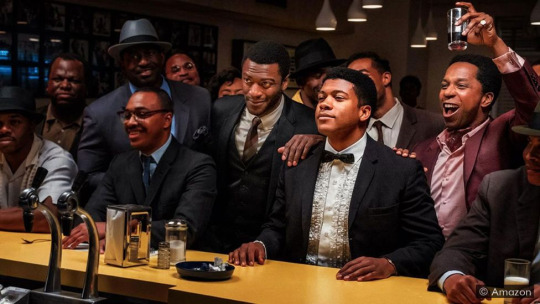
Films: 5
Best Film of the Day(s): One Night in Miami
One Night in Miami…: I guess you could form an argument that basing a film on a pre-existing play would make the feature easier to put together, but that wouldn’t be taking into account the tremendous differences between the mediums, their relative strengths and weaknesses. For her feature debut, the Oscar-winning actress Regina King has cinematically adapted the stage play by Kemp Powers about a fictionalized fateful night amongst four famous Black men in 1964. Those men, Malcolm X (Kingsley Ben-Adir), Jim Brown (Aldis Hodge), Sam Cooke (Leslie Odom Jr.), and Cassius Clay (Eli Goree), are all in town ostensibly to celebrate Clay’s beatdown of Sonny Liston to first become the heavyweight champion of the world at the tender age of 22. But the film puts them all together in Malcolm X’s modest hotel room, watched over by Nation of Islam security men, to spend a night, essentially, debating the merits of what they bring to the struggle for Black equality and economic emancipation, and arguing back and forth about their distinct positions. Here is precisely where many play adaptations falter, without the dramatic friction of a live performance to power the emotional core, such conventions generally fall flat on the screen, but King’s virtuoso acting instincts serve her able cast well, and her work with DP Tami Reiker allows the film to flow, seemingly organically between its few location movements. Working from a skilled script by Powers, the celebrated figures feel three dimensional, which gives even their more didactic diatribes (Malcolm), and pithy rebuttals (Cooke) enough weight to avoid sounding contrived. The cast work wonders on the material, granting a needed organic vibe to their nonfiction characters, echoing the essences without tipping into caricature. It’s a strong debut for King, and the film’s complex ruminations on the responsibility of successful Black people towards their community as a means of bringing attention to the country’s oppression couldn’t be more on point. At one point Clay tells Cooke the four of them will always remain friends, because they are among the few who can possibly understand what it’s like to be “young, Black, famous, righteous, and unapologetic.”
Shiva Baby: Danielle (Rachel Sennott) is in the midst of having a day. Turns out Max (Danny Deferrari), the sugar daddy with whom she has frequently been visiting as part of her regular prostitution gig, is somehow a friend or cousin of the deceased at the same Shiva she has come to attend with her well-meaning, but completely overwhelming parents (Polly Draper and Fred Melamed). If that weren’t enough in Emma Seligman’s spry comedy, Danielle is also horrified to find Maya (Molly Gordon), a successful young woman she’s known for years, and a recent ex, also there. Crammed into the Shiva house, full of cousins and aunts and uncles all kvetching about everyone else, and being physically grabbed and moved about by her mother, Danielle faces this house of horrors, with everyone commenting concernedly on her weight-loss (“You look like Gwyneth Paltrow — on food stamps!” her mother hisses at her), and her lack of job prospects when she graduates, and her parents telling scathingly embarrassing stories about her in front of Max and his shiksa wife (Dianna Argon), whose 18-month-old baby, her mom says is “freakishly pale — and no nose,” with no respite in sight. As a result of this sort of hyper-scrutiny, Danielle goes the only route that makes any sense: Lying to everybody about nearly everything, from her current major (“gender business”), to the many job interviews she has supposedly lined up. She’s just trying to get through the ordeal, one that Seligman, along with a continually spiraling score from Ariel Marx, ratchets up, until, near the end, poor Danielle is in a near fugue state, sweat glistening on her face, and the attendees, shot in unflattering slo-mo, and distorted lenses, take on the sheen of a waking nightmare. At a brisk 77 minutes, the film still doesn’t have quite enough to sustain its running time — at a certain point it begins doubling back on itself — but it’s still a lot of horrific fun, as Seligman expertly captures the absolute loss of agency one can feel, swallowed up in a claustrophobic family gathering, where escape feels futile.
Limbo: If Scotland has a cinematic identity, as such, it seems like the kind of place, desolate and unforgiving, where individuals come to exit regular society and come to a land filled with eccentric loners (stoic and unique in their oddities), in order to get better in touch with their souls. Ben Sharrock’s serio-comedy captures both the pitiless beauty of the land, and the lonely plight of a Syrian immigrant, Omar (Amir El-Masry), waiting with a group of other men from across the Middle East and Africa, on an island off the mainland, for word from the Immigration Office that his bid for political asylum has been accepted. Omar, sweet-faced and approachable, was a musician by trade in his native Syria, and walks around everywhere carrying his precious oud, bequeathed to him by his grandfather, also a musician, even though his right hand is locked in a cast from an unspecified injury. Even without the cast, however, you get the sense that his heart really isn’t into playing, despite the entreaties from Farhad (Vikash Bhai), his Afghani roomie and self-appointed “agent and manager,” who wants him to enter a local music contest. Omar is carrying a significant amount of weight beyond missing his mother’s fragrant home-cooking. Talking to her on the lone payphone on the island, where other immigrants-in-waiting stand in line for a chance to hear from home, she implores him to speak to his older brother, who chose to stay behind in Syria and fight in the Civil War that has plagued the region for years. Omar feels guilty for having left, and suffers from having disappointed his father in the process. It doesn’t help him that the culture he finds himself in seems so foreign to him, despite his speaking flawless English. Sharrock’s brand of deadpan perfectly suits the setting, but as funny as the film can be (when asked in a culture/language class to create a sentence using the “I used to” construction, one immigrant offers “I used to be happy before I came here”), it doesn’t paint a rosy affirmation for Omar and his ilk, stuck as they are, as the title suggests, between countries and lives. Omar’s pain is real, and for every positive step forward he takes, it’s one further away from his family and his beloved home country.
Enemies of the State: Sonia Kennebeck’s challenging and curious documentary seems at first to present a case for its protagonist, Matt DeHart, a young teen hacker interested in social justice, who through his work with Wikileaks runs afoul of the U.S. government, and his beleaguered parents, Paul and Leann, who vigorously defend their only child against the evil forces conspiring against him. Through a series of personal interviews with Paul and Leann, both retired Air Force intelligence officers, who believe their country has turned against them for what Matt had downloaded from his computer into secret thumbdrives shortly before the FBI arrived at their door and confiscated all his equipment, and various lawyers they employed, first to protect Matt from what they claim as utterly bogus child-porn charges, then, after they slip away to Canada in the middle of the night, the lawyers trying to earn them asylum. While in Canada, under close supervision and confined to his parents’ apartment, Matt uses his charms, his hackavist bonafides, and his skill at PR, to generate enough interest in his case to become a digital cause celebe, along the lines of Edward Snowden and Chelsea Manning. Protests are fronted, defense funds gathered, and pressure put on the government to come clean about why they seem so hard-driving against the young man. During a peculiar reenactment set in a Canadian immigration hearing — Kennebeck employs actors who apparently lip sync their lines in perfect time with the actual recorded audio — DeHart describes a harrowing ordeal earlier in the affair, after having moved to Canada to attend college, being abducted by the FBI shortly after crossing the border to renew his Visa, and tortured for days for information related to the material on the thumb-drives. Some documentation seems to corroborate his claims (even Paul and Leann, as fierce supporters as can be, were shocked to see just how ready the FBI were to snatch him), but as the film continues, and we hear more and more from the investigators and prosecuting attorneys about the original child-pornography crimes, it becomes clear that our sympathies are being played with by Kennebeck. By the end, the film itself becomes an indictment of our rapid-assumption culture, in which decisions of guilt and innocence are determined in seconds online and forever after based on the presentation of information before us.
The Way I See It: For non Trumpites, the switchover from eight years of the dignified, intelligent, and measured leadership of Barack Obama, to the perma-tanned tackiness of power-mad, narcissistic bloviating of Donald Trump, was like a double-feature that went from Citizen Kane to Kevin James’ Loudest Farts. One man better than most to measure Obama’s time in office against the subsequent regime is photojournalist Pete Souza, who served as the official White House photographer for both of Obama’s terms, and has gone on to become an outspoken critic of Trump by way of his devastating IG account, in which he juxtaposes stately Obama photos with Trumps scandal-du-jour. Lest you think he’s just another divisively partisan liberal, you have to take into account his previous turn in the White House, as one of the official photographers for Ronald Reagan’s presidency. In fact, Souza’s fly-on-the-wall quality was considered one of his strengths in the oval office. Documentarian Dawn Porter travels with Souza as he makes the media rounds promoting his newest book, Shade, a collection of those IG photos that have earned him millions of social media followers (a sort of companion piece to his previous book Obama: An Intimate Portrait). Hauling from far-off India (where he gets a standing ovation before he even takes the stage), to domestic conferences and speaking engagements, Souza emerges as a man becoming more used to being out from behind his ever-present Canon lens. Through that lens, as he displays to his rapturous audiences, he has taken many hundreds of indelible photos, showing Obama’s various interactions with foreign dignitaries, his council of cabinet members, and his more raucous time with his two daughters (one shot of Obama with his girls making snow angels on the rear lawn during a heavy snow storm remains his computer screensaver, Souza says with pride). As Porter moves from talking heads to public oratories, Souza’s remarkable photos — brilliantly composed, and inspiringly intimate, having been given nearly unlimited access to the president — play throughout, showing us a collection of images that capture the inspiring hope the president inspired and the agonizing rigors of the job he was elected to perform. The film spends little time on his Reagan years, except to note how media and image-savvy the former Hollywood actor and his wife were (Souza professes no political ill-will towards the Reagans, other than noting that while he didn’t always agree with him, he was a genuinely caring man, who at least understood the parameters of leadership). At first, the film trolls Trump by a sort of subtweet level of backhandedness: Without directly naming names, Souza makes it entirely clear who he finds failing in comparison to Obama’s empathetic, engaging deportment, but by the time the film comes around to his notorious IG account, there can be no doubt the subject of his ire. Souza maintains it has less to do with his partisan feelings (his political affiliation is never revealed), and more the way he finds the current president’s undignified manner and total disrespect for the office and the leadership it demands unacceptable. Trumpers will of course take great exception to the portrait the film portrays of the sitting president, but even the most hardcore GOP folks won’t be able to help noting the blatant differences between the loving, genuinely close Obamas; and the preening, viciously competitive Trumps, each trying to outdo the others in acting as their father’s primary sycophant.
In a year of bizarre happenings, and altered realities, TIFF has shifted its gears to a significantly paired down virtual festival. Thus, U.S. film critics are regulated to watching the international offerings from our own living room couches.
#sweet smell of success#ssos#piers marchant#films#movies#TIFF#tiff 2020#toronto international film festival#one night in miami#regina king#limbo#The way I see it#pete souza#nomadland#frances mcdormand#chloe zhao#the new corporation#summer of 85#francois ozon
8 notes
·
View notes
Note
i am SO delighted to hear that the "detective and five people trapped on an elevator and one of them is the devil" movie is real and you saw it. also while trying to send this i accidentally clicked the Unfollow button (and then promptly refollowed), sorry about that
lmao i maybe wouldn’t’ve noticed, love Tumblr Notifications and how like, they display different on desktop vs mobile and the way it Condenses them is only so helpful cuz sometimes some of them only display for 0.2 seconds while i’m on mobile and it hasn’t Refreshed in a way that reshuffles everything and i can’t view that particular [Like from a certain person or smthing] ever again lmao like i hate this, it’s bad, just like that movie about people trapped on an elevator and a detective has to get them out and has to act fast b/c one of them is the devil
it is so stupid first of all like. it’s just overall not a great movie from Any of the angles it’s playing like. first of all the Detective is only around b/c he’s solving a nearby murder / death and making like. corny dumb “oh this is a Smart guy” observations about the Scene and someone is like “oh hey @ cops you’re already on the premises, come solve the mystery of Elevator Broke” like i don’t think that’s how it works and also i can’t even remember the reason they find this issue That pressing pre-realizing And One Of Them Is The Devil. maybe someone dies right off, idk. there is conflict on the elevator so naturally that’s a whole other thing like, we’re all trapped in this elevator together and maybe one of us is untrustworthy and liable to be dangerous to the rest of us like, i don’t know the Contrivance that makes these people think anything has to be done but just Stand Around for a while but it’s you know. that whole Thing where there’s a premise of “some shit is happening to Incite Conflict amongst strangers who are trapped in a bad situation together and they’re all apparently raring to judge each other’s moral fiber to decide who deserves Suspicion vs Protection.” but also, one of them is the devil
meanwhile on the outside it’s this dumb Cop Mystery Drama where this rando guy apparently sets aside the death he was investigating earlier to solve this elevator situation (i think eventually it’s revealed that that death was tied to the elevator situation all along. i think that the devil killed the guy. or something) and also, maybe there was Coincidentally some kind of heist going on at this place b/c i remember at some point the detective (and some partner there too involved in all this) like, find some tools hidden in a bathroom like “aha this was Used to do [whatever]” and despite having no idea what the details are i Know i remember this b/c of at the time going “oh my god that is so dumb Nobody Would Do This / this makes no sense” lol like. writing not great. and this was maybe Not the devil, but a regular separate scheme to. do something
also there’s some aspect where Main Cop has some tragic backstory and is like, not over it b/c it was so painful. i think maybe someone like hit and run his wife or something like that. you know how it goes. spoilers in that i think the person that the devil is here to kill (more on this devil assassination thing....) was Behind That somehow lmfao so it’s like really??? is that our resolution, that people’s stories are Converging in a very serendipitous way b/c the devil would like to give people emotional catharsis......idek. look, spoilers, this old lady who “dies” in the elevator relatively early on turns out to have been The One Of Them Who Is The Devil, Act Fast. and it was this weird thing where the devil is like “grr whoever i’m even here to Get in the first place is just Such A Bad Person that uhhh i guess i came here in person to take them to hell” like.....what tf kind of Lore......this is definitely going with “aaaah the devil is evil” approach, not any more kind of Neutral figure, but then in the end apparently the evil devil is just really Judgey and Disgusted by someone being A Bad Person like??? you ought to love this shit!!!!! and anyways the detective learns that One Of Them is The Devil b/c when they take him up to the security camera display hq it’s like a) look at this scary Moment where the elevator camera feed gets staticky and a scary face appears for a moment (im not sure if i could see what it was supposed to be lmfao) This Means Something and okay oh my god i reread the plot summary b/c for the life of me i couldnt remember the ending, it is so stupid oh my god
okay so first of all the Dead Person the detective was investigating had left like a suicide note like “i am killing myself b/c um. the devil approacheth” like wow okay right off the bat? amazing foreshadowing. why does this person Know this?? and why should he care b/c the devil is here apparently for a Special Soul Collection like, this has nothing to do with you, random guy?? you don’t even need to worry like. just stay home from work to avoid the fairly minor problems that occur (like MAYBE one guy dies in the course of this story but i think it’s a little ambiguous, meanwhile whoever Really Dies in th elevator was i think due to like, suspicion and infighting lmao. idk maybe the devil killed a few of them. it’s weird) but yeah the highlight is this
everyone please enjoy this scene. security guy ramirez is explaining the Devil Expertise courtesy of Where I Come From where toast falling jelly side down is evidence that the devil is hanging out in the elevator.
while looking up “devil toast” the result immediately after that one was “the devil takes the toast” which is a devil takes the hindmost ytp which i feel is really fitting
it kind of undercuts the stakes i think when not only is the devil only sorta gently radiating Bad Luck but also is just super Righteous but like. yes it turns out that the devil is here to Claim a guy on the elevator was the same dude who Hit N Run the detective’s family (wife and kid apparently) those years prior......except like, it wasn’t even like oh he assassinated them On Purpose, it’s apparently already a Known Detail that although they ~never knew~ who killed detective joe’s family (idk what his name is idc) there was a Note left on the scene like “sowwy :(” like really? this is the Big Bad that the devil made a special corporeal visit for??????? and then, get this, when the devil is like “i’m not a dead old lady, i’m the devil, and i’m here to Get you b/c you accidentally killed a couple of people and i, the devil, am really disgusted by how sinful you are for that” the guy is like “yes that was me :’( i’m sorry” and then the devil is like “ah fuck you’ve Repented. i can’t take you to hell anymore. bye” like what!!! why did he only have to feel bad about it to get out of this whole situation when obviously he Felt Bad in the first place b/c he up and left a note like “[grimace emoji] aaa my bad” like, did he have to apologize To The Devil?? the lore i s2g. Jelly Toast Rules operating here i guess.
anyways then the detective who witnessed this i guess is like “wow the guy who killed my family all those years ago but i’m still sad about it.....well i’m gonna arrest him now. but also, I Forgive Him.” oh and also for a while there the detective was so gritty he didn’t believe in The Devil b/c the vehicular manslaughter apparently made him think that human nature was evil enough to not need the extra help. so now he’s made the arc of getting uh, emotional closure on his family’s death by forgiving the dude who i guess super crashed into them on accident, And gets to know that the devil is real actually and he’s on the elevator but now Not b/c he was like “ah jeez thwarted by this guy uh, feeling bad about the accidental deaths even though he felt bad in the first place” and there was no other point to the detective being there b/c he didn’t Really do shit except i guess drive this sideplot where you are led to believe he Might figure out who the Bad Guy on the elevator is. (it is the devil. one guy has a crime record or something but, spoilers, he is trying to turn his life around with some good honest work as a security guard or something. idk)
it was amazing and very stupid and i was continually indignant b/c the writing was dumb and made no sense and just so fucking corny throughout. the entire movie is called “devil” and i remember it was like “tf is ‘devil’” and as soon as it involved an Elevator i was like omg omg is this And He Has To Act Fast Because One Of Them Is The Devil, and it was, so that was exciting. it was a dumb waste of time but also it was not b/c it was *slightly* so bad it’s good. mostly Not Even. but just watch the toast scene there b/c like. i think that’s this movie’s #1 contribution outside that post about the plot summary.
#Thank You for this excuse to go on for a while about Devil (2010)#it's also weird it feels more like. mid 00s than that#anyways i appreciate you as always#just the shot of the toast going Thwack on the floor followed immediately by other guy going ''what are you - what are you Doin...'''#SO good
6 notes
·
View notes
Text
Robin - the First Miniseries - Issue #3 review - (R.I.P Tom Lyle)
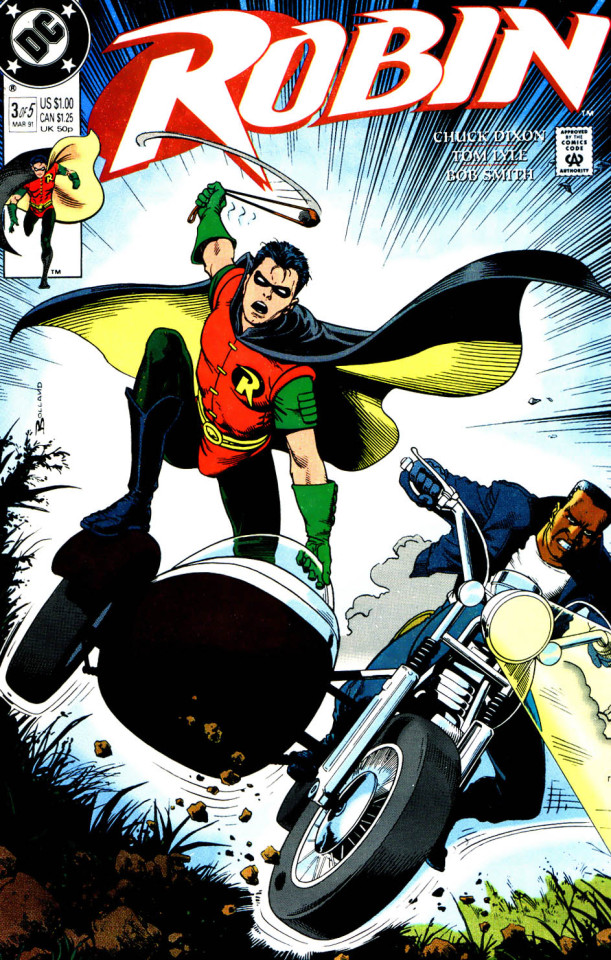
One thing I find kind of endearing about Tim’s narration, is that it reads like a kid that has to recount stuff just for his own sake, because he’s having a hard time believing any of this is happening.
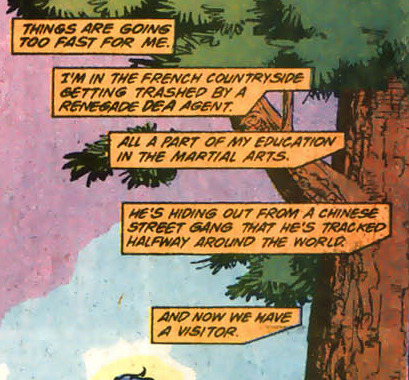
Which matches up with the face he makes.
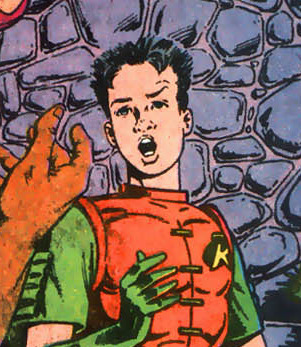
--
Have some more people seemingly finding Timmy adorable.

Although, you sort of have to think that Tim’s too innocent for his own good sometimes, because he’s trusting the women that calls herself “The Most Dangerous Woman in the World” probably because she treats him like a baby.
However she does say she met Batman, but even then, for some one who works with the notably untrusting Batman, Timmy’s a bit too earnest and naive to trust her so fast just because she can’t stop pinching his cheek and treating him like a puppy.
That’s just good character work though. Tim isn’t perfect, a big part of this miniseries is how out of his element and naive Timmy is. So it just fitting in with his character.
(The next scene ruins this though)
Lady Shiva: I diagnose you with baby
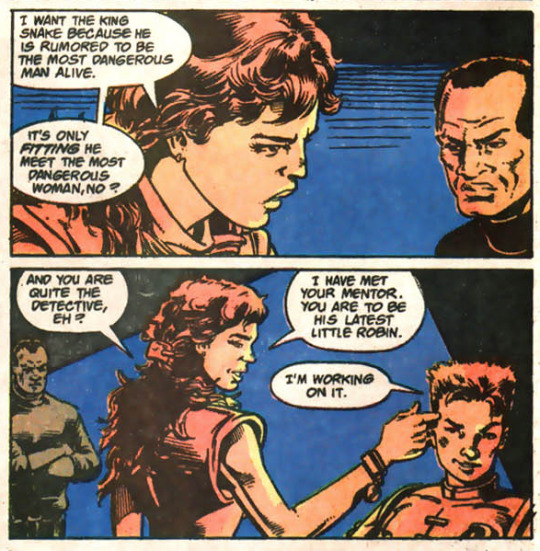
Very early on they set up this bizarre trio’s dynamics pretty fast.


It’s done fast, but very naturally. It’s done through natural character interaction. So it isn’t distracting. It’s well-done. Even if it sort of implies Clyde’s a sexist, but ya know what, character’s aren’t made to be perfect people. They’re made to serve a function in a story. Part of me wishes they’d delve into it more though after they set the stage for something that’s mostly just left at implication. To leave a moral of some kind after such a salty interaction ya know, because it’s taking away the function. I guess Lady Shiva does tell him off for it though. So I suppose that’s the function.
(Which isn’t the last or first time questionable morals from side character’s get left behind, but sadly it gets more blatant and gross. It’s the main flaw of the miniseries. Occasions of awkward writing imply stuff that doesn’t get furthered acknowledged, when it feels like it should be)
So the character dynamic is like this:
Tim is the naive, computer baby, who both of the adults like.
Lady Shiva is the terrifying dangerous woman who knows stuff
Clyde’s the untrusting, rough around the edges, angry one
Lady Shiva and Clyde can’t stand each other, but they’re pretty much here for the baby at this stage. So they’re going to have to try to get along for this little adventure.
Very simple, but this miniseries is 5 issues long, and it’s genuinely all you really need to understand what these characters are going to be like. In general that’s a lot they set up for their dynamics in just one scene. So that’s pretty good actually. These aren’t characters that are gonna last long together, to get just that much for something short lived is good work.
After pretty much failing every fight he’s been a part of, Tim probably seems pretty useless to people, but here’s to remind you, that he’s not.

His strength isn’t his fighting ability. He isn’t Cassandra Cain (who wasn’t created yet. Well, technically, but I mean in the real world perspective). His strength is using his talents at computer and mind to help solve crimes. That’s how he’s useful.
While no genius. He’s clever. That’s his talent.
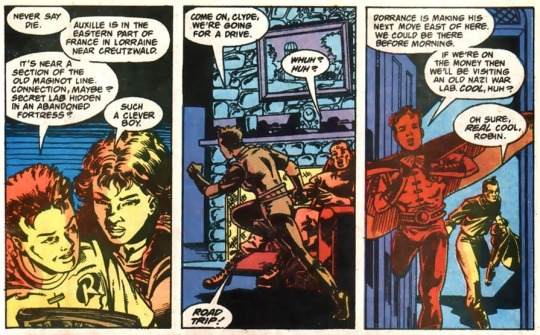
Another cool thing about this issue is that this is were Timmy finally starts getting into the groove of this superhero thing.
He’s still not great at it, but you see him start getting more used to it compared to the first two issues. He’s growing as a hero.
--
The thing about this issue that I don’t like though, is that it starts to delve into trying to give Timmy a case of the “not gays”, because it randomly starts to pretending that Tim’s interactions with women were more than what actually happened.

Like as far as what was actually drawn in written. It looked more like Tim was wanting to show off to his mommy that was giving him tons of affection more than anything else.
Even the writing of this scene kind of says Tim doesn’t care. The way he words himself “I guess”, like he didn’t actually think about it. Which fits in with his character. He doesn’t seem to care about girl’s that much. I expect this reaction from him, but it’s how the comic itself continues to tease Tim with girls in a way that feel unnatural, because he’s not even getting flustered like how a kid would when getting questioned with girls. He’s just like “I suppose so”, like he doesn’t even care. The look on his face is so low-key too.
The writing of the scene even goes to say he actually thought of her as scary, which adds even more disconnect, because he clearly wasn’t scared of her. He was melting into her palm and was enjoying every compliment and cheek pinch he was given.
Maybe it’s just Clyde trying to ruffle his feathers though when it comes to the teasing.
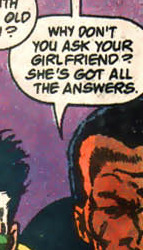
There’s a certain amount of disconnect for me regardless, given how the previous scene played out to this. It’s just strange. Maybe that’s supposed to further Clyde’s character as a sexist maybe? But that doesn’t get fully played out either.
Things don’t add up much in this issue as well as the others that were really good with the character thing besides one scene.
As far as the last scene went, it’s played out like Tim loves Lady Shiva because she treats him like a puppy. There’s nothing to imply he found her attractive, even in this scene despite Clyde acting otherwise, seeing how Tim didn’t even think of her being beautiful (he had to have that pointed out to him), but instead scary, but even then there’s nothing there to imply he finds her scary either in the first scene. He seems too innocent and trusting actually. So it’s just a badly written scene, because it’s not adding up.
--
They continue this weird disconnect even more so into the next scene with Lynx, because Tim even backed away from her when the flirting started.

Because freaking when? He blushed when you showed him affection. He melts when you touch his cheek. That’s what they actually show happening, but what do you mean lovestruck? He saved you cuz you were getting messed with and hurt. He did the same thing with Clyde. He even took Clyde’s clothes off if you wanna force any sort of lovestruck, but that’d be creepy if Tim did that cuz he had a crush, so i’d rather not go that far with it. Just trying to prove a point.

Like look at him. He’s freaking uncomfortable. This doesn’t scream “lovestruck” to me. It’s more disconnect that throws the scene off of tone a lot.

If anything you were lovestruck in him. He’s trying to back away.
The kid just melts in times of affection, that’s what they actually show us, and girl’s are the ones that give him affection. There’s not actually a lot, arguably freaking nothing besides how he acts when he gets affection, that screams lovestruck. Other people say he is more than what Tim himself actually shows.
Regardless of the weird sudden insistence that Tim was in love with this girl more than what’s actually shown. There is some great imagery by Tom Lyle that the scans don’t do justice.
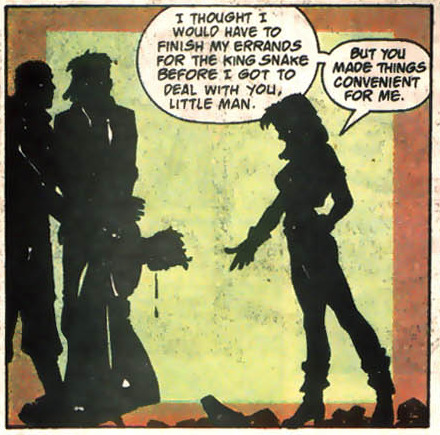
Some nice moments that shows Tim getting more used to the superhero life style too.

But of course there’s more of this ‘Timmy’s weakness for girl’s’ talk that doesn’t add up to how he actually interacts with him.
It’s like a bizarre crude bad version of ‘show don’t tell’, they’re telling us something when they show something else.

Like Clyde, Tim took you to a fancy hotel and rented a farm house for you to stay in as he bought you new clothes. If you were Tim’s age that’d be considered romantic, and Tim might be called a sugar daddy. He’s shown to have more of a crush on you then freaking Lynx at this point, okay, and I don’t even think Tim has a crush on you. You just don’t pinch his cheeks and play with his hair like everyone else.
(And don’t start any gross ships okay. Clyde looks at Timmy more like a son above anything else, and there’s a massive age gap, along with it being genuine pedo-freaking-philia. I’m just saying this whole thing is dumb to me, because besides being incredibly easily susceptible to any form of affection he is not shown to have an attraction to anyone. So it makes this seem contrived. They don’t do anything to show Tim has an actual romantic, sexual, or aesthetic attraction to freaking anyone. He just loves affection)
--
Have some more Timmy getting used to this superhero thing, showing his morals, and actually being pretty bubbly.

He’s adorable.
Although maybe he’s getting too used it, because now he’s got that little kid instinct of going a bit too far and too stupid with it.
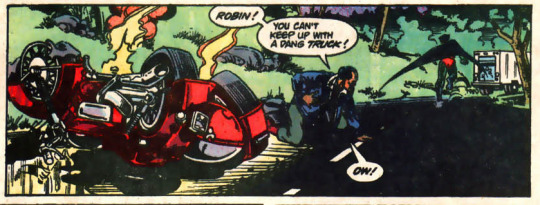
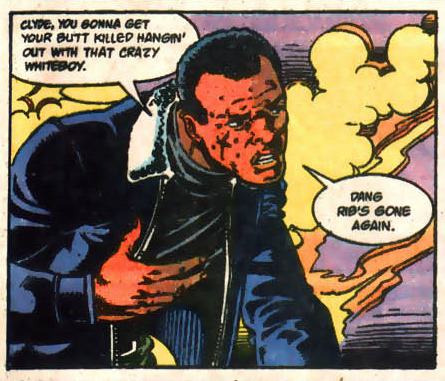
A pretty fair reaction honestly.
--
So there’s some panels of showing off how rich King Snake is, which I instinctively skipped over because he’s so forgettable that I forget I should probably actually pay attention to him.
Basically he’s going to poison the water supply, and unleash a plague into people’s houses.
I can’t wait for him to burn the crops too. I don’t remember what he does, so I have no idea if he will, but I sure hope so.
--
Timmy doing some computer styled detective work, because this is one modern boy. I wish they’d have Tim just solve a crime on his phone in a current comic, because he’s not an Oracle-styled computer user, he’s mostly just a kid that knows how to use the internet.
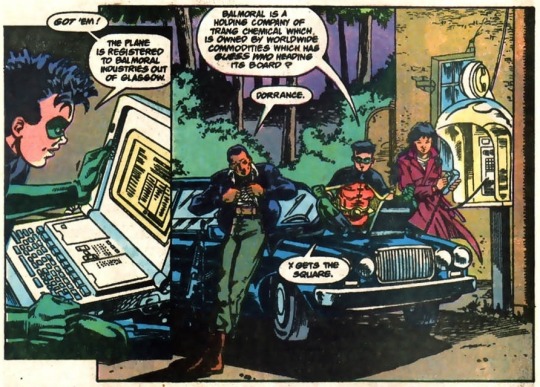
He’s so small. I love him.

Baby Sherlock does his best to use his big brain to put it to good use solving the case.
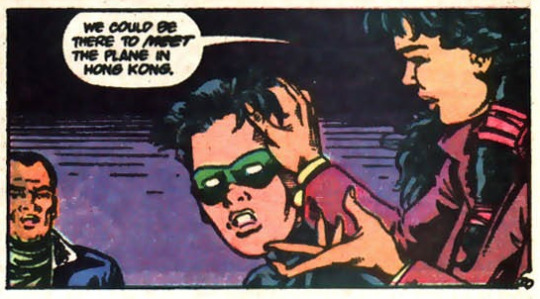
--
Another notable trait of Timmy’s, is that he is perseverant as could be. Like he just went to France to learn more martial arts and some street smarts cuz he gets his butt kicked too easy and he’s naive as could be. Now he’s stopping a terrorist with two people he didn’t even know.

They also delve into a bit of the understated sadness of Tim’s character. How, despite him obviously being a kid, who acts like a kid so far no matter how heroic he tries to be. He doesn’t feel like he as himself should be a kid.
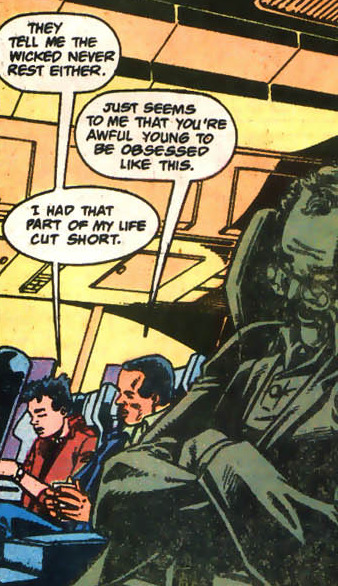
It’s a theme that gets hit harder and harder as more tragedies in his life hit him.
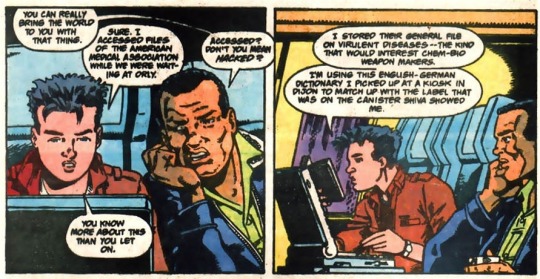
The child continues to use his handy dandy laptop to solve more crime, because he is one useful baby and--
Oh, I wasn’t joking about the plague stuff for a Spongebob reference.
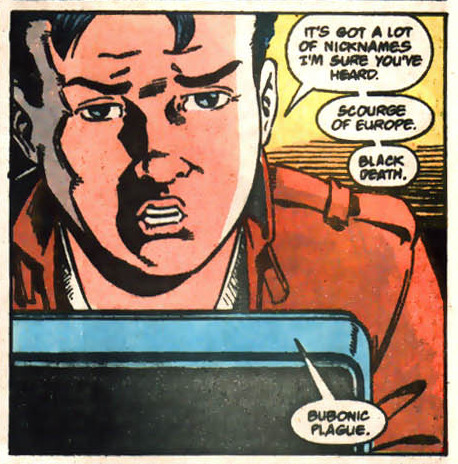
So I’m just waiting patiently for King Snake to start burning some crops.
--
This issue is better then I let on.
The character dynamics are good (when not forced), the pacing is great, the story moves at just the speed it needs to, and the character’s just keep getting fleshed out more.
It’s great stuff besides the weird forced romance stuff that’s annoying for the middle part of the issue, and Tim and Clyde’s chat about Shiva, like if that wasn’t there, this would be an issue I can’t really imagine having a problem with besides King Snake being lame, but that’s more of something that goes across all issues really. It’s not a this issue thing, although you can argue this issue should’ve done more to make him more entertaining over boring.
I even went back to find if there was any indicator that Tim has feelings for this girl, and beyond him melting at the first sign of affection. There’s nothing. He talks about saving her like it’s simply part of the job to him, the same way he talks about saving Clyde. There’s just nothing besides “girl and boy”, which is incredibly lazy and causes it to feel contrived.
In fact I just found more showing that Tim’s oblivious that people keep thinking more than what is.
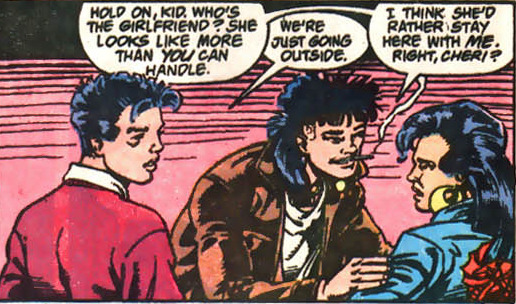
Like look at that. He’s confused why the jerk’s even saying “girlfriend”. This is what leads to him saying “this isn’t a good idea” when she starts getting flirty.
Tim’s not even remotely lovestruck.
As far as what’s shown he just loves affection.
I’m being repetitive about it, I know, but romance simply because “boy and girl” is dumb, and the fact that Tim actually isn’t interested in them as far as what’s shown and not just said by OTHER characters makes it more annoying.
Funny enough though, given how despite Tim shows no actual attraction to girl’s despite what the other characters assume. It actually makes it easier to interpret him as gay in this miniseries honestly. Cuz he’s going through the gay experience now even if the writer most likely didn’t intend that.
103 notes
·
View notes